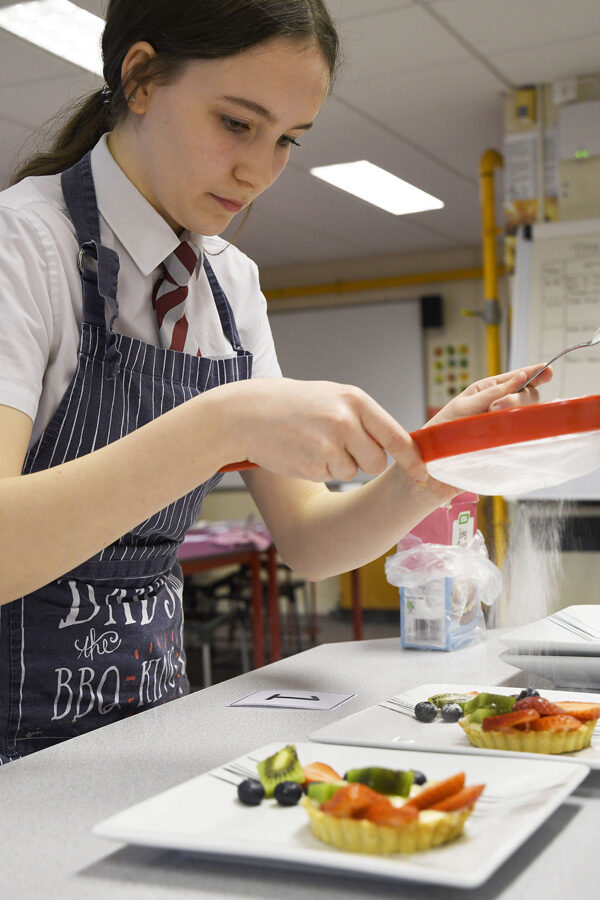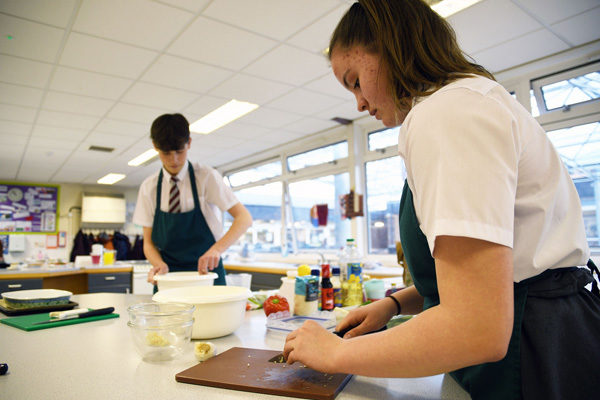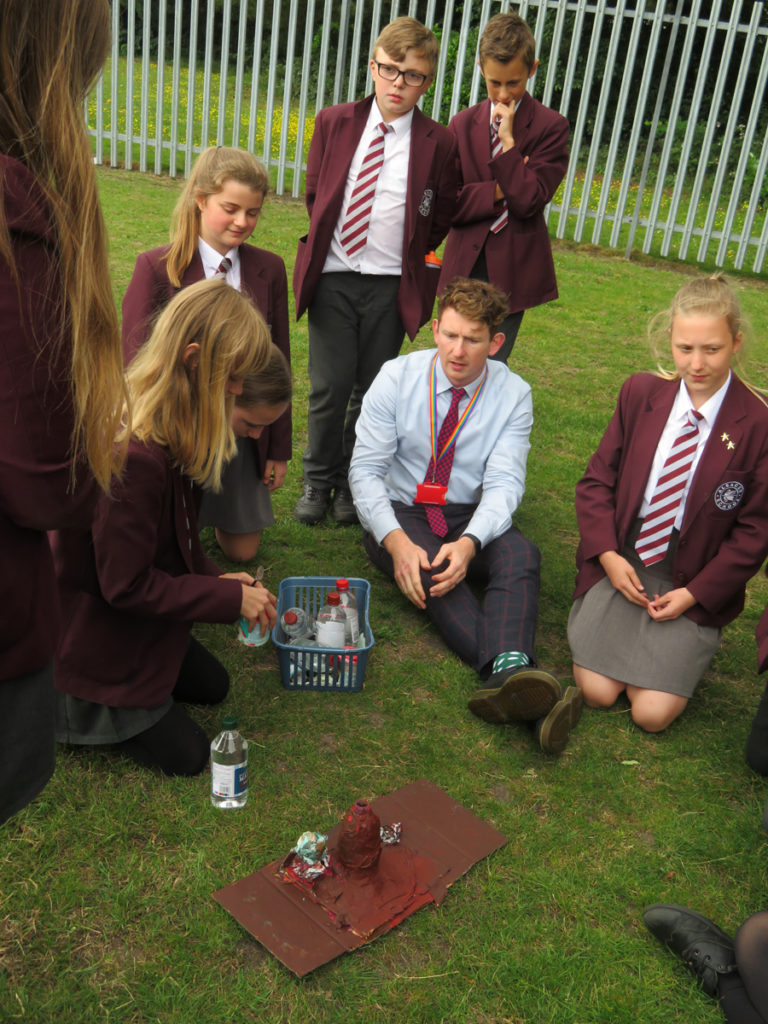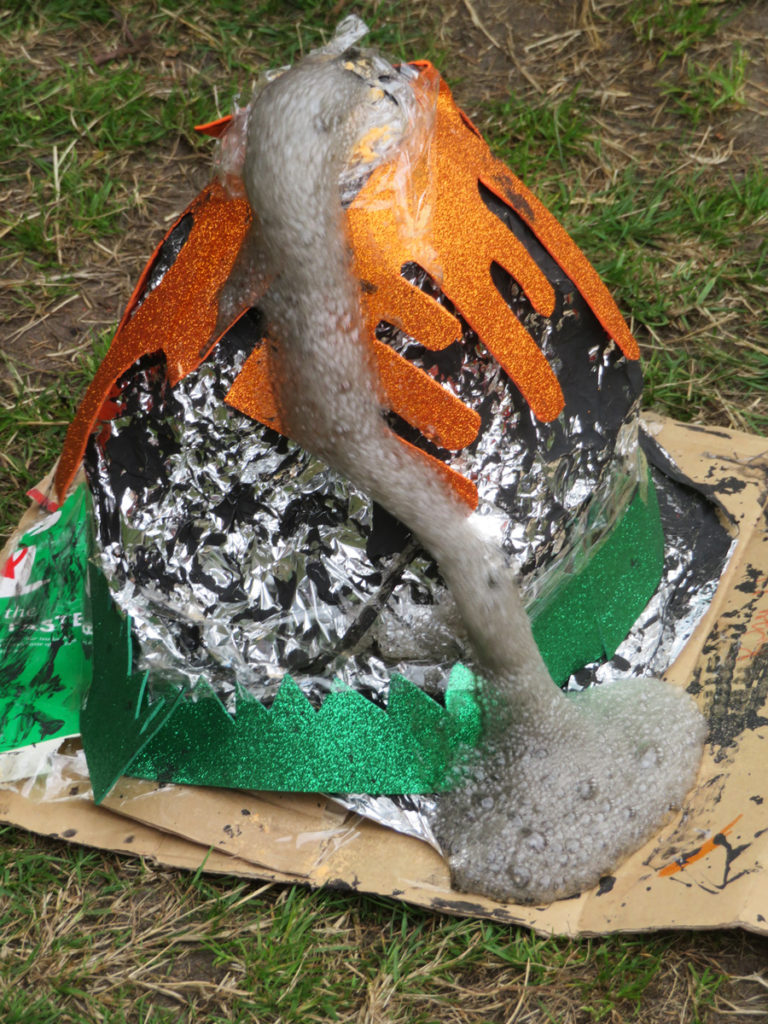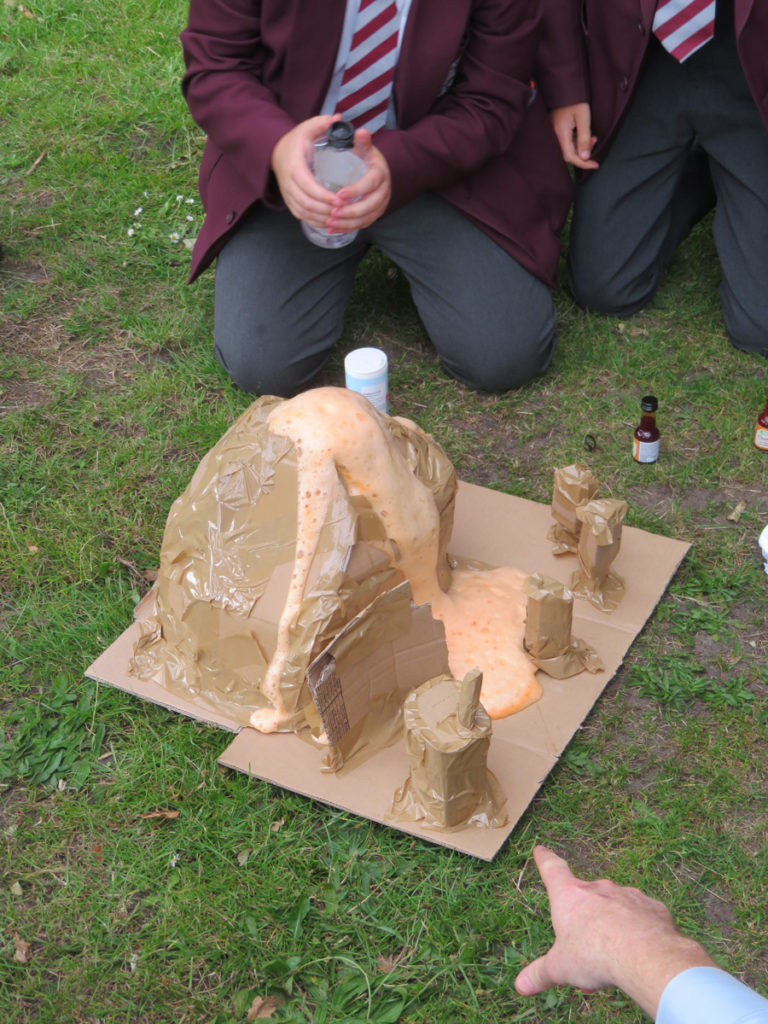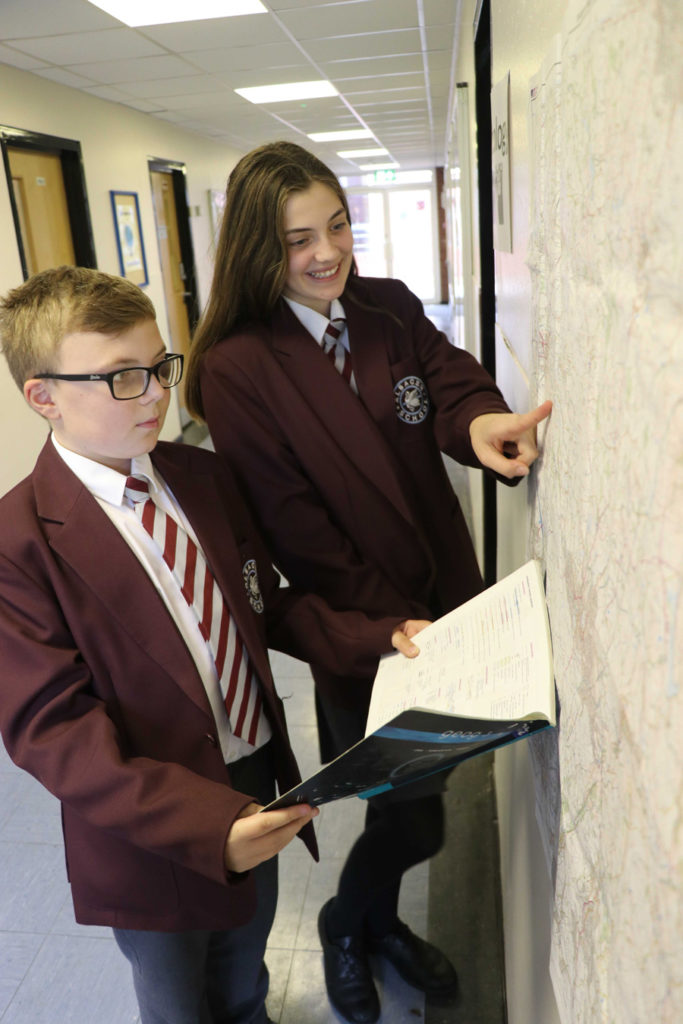What is it like to be a... student
Find out what it’s like to be a student of Alsager School by exploring the subjects list below:
What it is like to be an A level Art & Photography student at Alsager School
The Art department aims to provide an inspiring environment where students can express themselves and develop their creative skills. We offer A-levels in both Fine Art and Photography. In order to give you an insight into what you can expect to study on these 2 courses, we have included a short summary highlighting key features as well as the views of some of our current A-level students discussing their experiences.
Fine Art A-Level
The Fine Art course is a two year A-Level subject where you will develop and learn how to make informed decisions about your own creative artwork and the world around you in a culture of experimentation, exploration and critical reflection. We will support you to become skilled in your ability to use a broad range of art materials and techniques influenced and inspired by the work of contemporary and traditional artists, designers and photographers. You will be challenged to investigate and reflect upon your own practice to take imaginative and creative risks in the artwork you produce.
Building upon the techniques you will learn, you can explore any combination of painting and drawing, mixed media, intaglio printing, photography and digital manipulation using Adobe Photoshop.
Each individual student will develop their own visual style influenced by the workshops we will deliver. The skills you will develop will be wide and varied with a particular focus on personal expression and developing your own unique style and approach. Fine Art is about looking, learning, thinking and communicating about the styles and work of your chosen artists.
At A-level for component 1 you will develop work for a personal investigation into an idea, issue, concept or theme supported by written material. This will count for 60% of your total A-level marks. In component 2 you will produce personal work in response to one of eight exciting starting points which will count for 40% of your total A-level marks.
Photography A-Level
The Photography course is a two year A-Level subject where you will learn how to use a broad range of photographic techniques influenced and inspired by the work of contemporary and traditional photographers, designers and artists. You will be challenged to investigate and reflect upon your own practice and to take imaginative and creative risks in the images you produce. You will be taught the Techniques of Production of photography including Adobe Photoshop and explore Documentary, Still Life and Abstract photography before developing a personal project. We provide you with your own Sixth Form Studio in D10 with access to computers in which you can develop your portfolio outside of lessons. The course is designed using Microsoft OneNote and your final portfolio will be a digital Flip eBook that can be accessed online.
Each individual student will develop their own visual style influenced by the taught photographic workshops. The skills you will develop will be wide and varied with a particular focus on personal expression and developing your own style and approach. The most exciting aspect of photography is that you are capturing the world as you see it through your own eyes.
Here in the Art Department we help students to learn in a supportive environment. I love teaching both Fine Art and Photography because it is truly inspiring to see how students embrace the skills they learn and then apply these in their work. The subjects we teach give students a platform where they can show-case their creative flair and express themselves in a way that is unique to Fine Art and Photography.
Mrs Donathy
Assistant Curriculum Leader for ADT
How is the A level different to GCSE Art?
“A-level art is an opportunity to develop the artistic skills you developed at GCSE but in a much more expressive and personal way. Each student has the opportunity to establish a personal style which was introduced towards the end of year 11” (Fine Art student)
“A level Art is relatively similar to GCSE, in the sense of the format of the coursework and the exam structure, meaning that the transition between year 11 and year 12 feels less of an overwhelming jump. Nevertheless, at A Level, students are given a lot more freedom as to what they want to do with their coursework. The Art Department at A Level provides a relaxed environment in which we can quietly get on with our work- I am always in there when i have non-contacts!” (Fine Art student)
What advice would you give to a GCSE student who is considering taking it at A Level?
“Ensure that you have a real passion for the subject as it requires dedication, effort, and a creative flare. Coming up with new ideas and concepts for your art can be tricky when its expected of you regularly, but a true artist flourishes under these conditions and utilizes the creative push, using this as an opportunity to demonstrate their skills and enjoy the creative process” (Fine Art student)
“My advice for going into A level Art is don’t expect to create a masterpiece straight away. It takes time, dedication, hard work and resilience” (Fine Art student)
“I highly recommend that you take it as it is a very friendly environment to work in. For me it truly brought out the artist in me and I am sure it will bring out the artist in you. I am still amazed that the teachers are equally as enthusiastic as the student to your work and are always ready to lend a hand and guide you forward. Since joining sixth form the department became my second home and I never complain about always being here as it’s so calm and friendly” (Photography student)
What has been the most enjoyable aspect of the course for you?
“I have really enjoyed being able to use different materials and media in my art as I find it therapeutic” (Fine Art student)
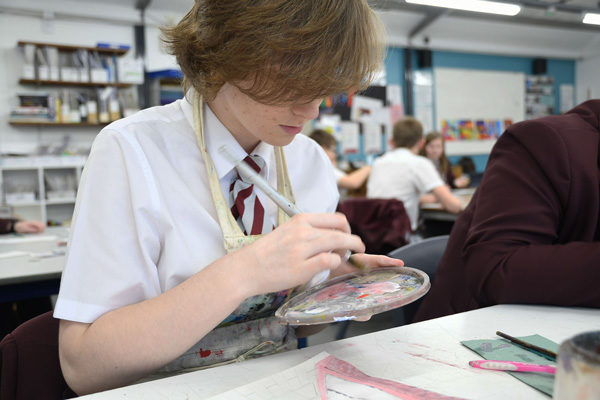
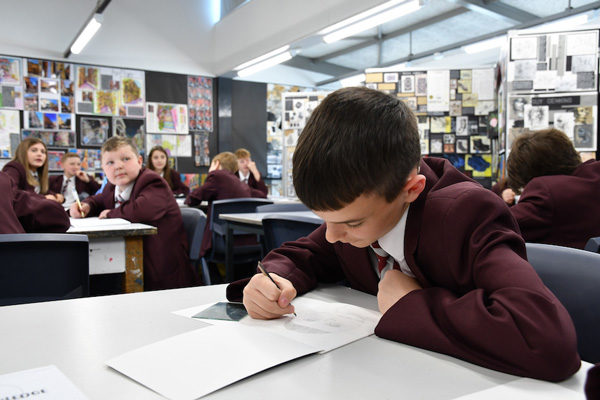
“Personal projects are definitely my most enjoyable aspect as you get to work with what you love and present a portfolio you are happy and confident with” (Fine Art student)
“The most enjoyable part of the course for me is when I’m setting up the shoot that I want and then looking at the photos that it produced. This is because it helps me to identify what I need to do to make my shoots better. We have explored how to change the exposure, aperture and shutter speed and this was useful in the way that I can change them to suit the different shoots that I’m doing” (Photography student)
What techniques and approaches have you explored?
“Since starting A Level Art, my ability to experiment, and be expressive has definitely developed. We’re constantly encouraged to push ourselves and try out new techniques, which really pays off later on in the course. When studying Clare Woods, we delved into abstract painting, and emotive colour use. Prior to that project, we explored a multitude of drawing techniques and illustrated natural forms. For me, Art is a development process and I’m constantly learning from my successes and failures” (Fine Art student)
“Within the course I have learnt how to use a camera manually and explored different camera techniques and tricks to make my images look better. For example, I have learnt how to paint with light. Painting with light is where you lengthen the shutter speed of your camera so that it takes the picture slower” (Photography student)
“I experiment with colour, different types of media and materials to create my pieces. I really enjoy creating art from natural forms and landscapes” (Fine Art student)
“In the beginning of the course we focused on natural forms and how photography can be used to alter how vibrant an image looks. Taking inspiration form Clare Woods, we produced concertinas, photography sheets and our own studies” (Fine Art student)
How have you been challenged?
“It can be challenging to generate new ideas and creative thoughts on a regular basis, but for anyone brimming with new ideas and inspiration, this should come easily. In fact, this provides an outlet for your creativity to flow” (Fine Art student)
“From the beginning of year 12 the pieces you create begin to build your portfolio therefore it is important to manage your time wisely. I have found that utilising my non-contacts to come to the art department is highly beneficial” (Fine Art student)
“I have been challenged to the task of learning how to use Photoshop and what you can do on it, also I have been challenged on how to use the camera manually rather than automatic meaning you control every aspect of the lens” (Photography student)
“Making sure the camera settings are right. Sometimes, it’s difficult to get the exposure correct or the focus correct because they aren’t on the right settings and this makes the photo’s come out wrong, either too dark or light or not being able to tell what the photos are” (Photography student)
What is it like to be a Design and Technology Resistant Materials student at Alsager School?
Design and Technology Resistant Materials (RM) at Alsager School is about problem solving using creative tools such as sketching, modelling, computer aided design and practical making skills. Students studying RM are encouraged to study the work of past and present designers in order to inspire their own project work. Our students design and make products using a wide range of materials: woods, metals, and plastics in an iterative design process.
Studying Resistant Materials at Alsager School gives students a chance to access information from the full range of Design and Technology subjects; students are exposed to a breath of knowledge including new and emerging technologies, design strategies, and other D&T material areas such papers and boards and textiles. Resistant Materials students will learn in depth about their specialist material; timbers including hardwoods, softwoods, manufactured boards and associated construction techniques.
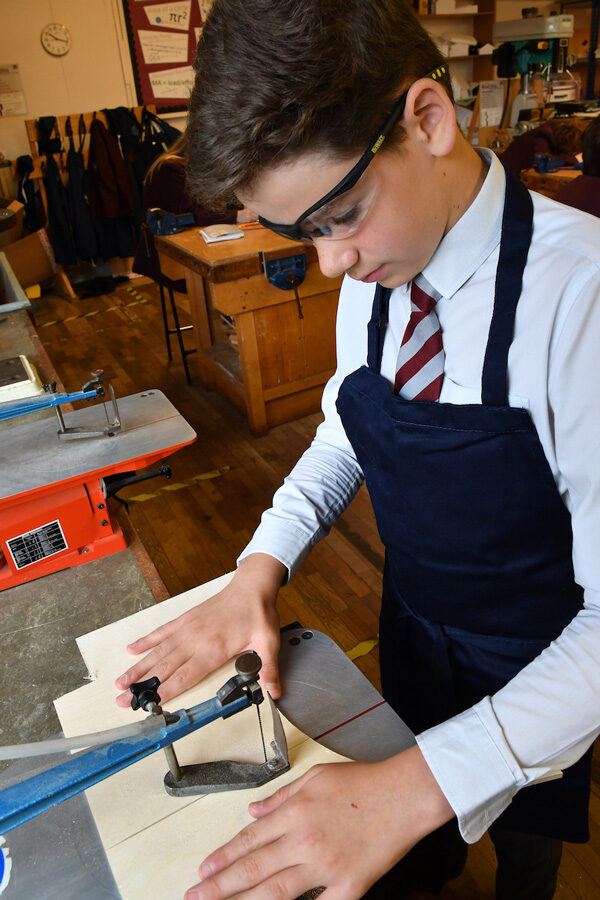
When conducting research for project work, students will analyse existing products to identify how they might be improved. They will present their ideas to others and use their feedback to further refine and develop them into a quality prototype. Our students will work with complex construction techniques such as wood jointing, laminating, metal fabrication, welding and casting. They will use a wide range of workshop equipment such as lathes, drills, milling machines and CAM equipment including laser cutters and 3D printers.
Working alongside Design and Technology students as their skills and knowledge develop is a highly rewarding experience. I love being a D&T teacher because we see students develop skills and qualities that will be useful in life such as resilience, independence, problem solving and team working. Many of our students develop a passion for the subject and go on to study and work in areas such as Engineering, Product Design and Architecture.
Mr W Potts Deputy Curriculum Leader Art and Design Technology.
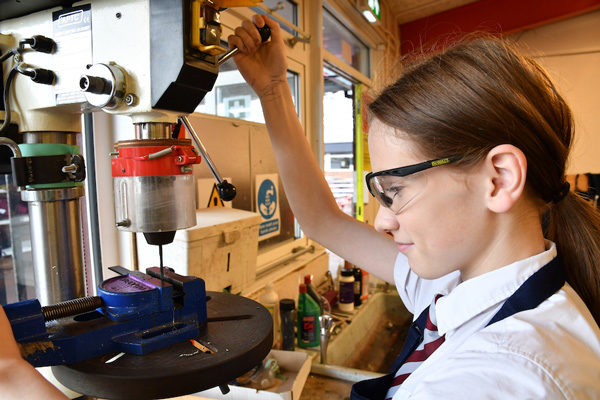
This is what Year 11 GCSE Resistant Materials students said about the subject:
What does it mean to be an RM Design student at Alsager School?
“In Resistant Materials, you have to use your imagination and work creatively. You get the chance to work in teams and independently and learn skills that could last you a life time. You improve your knowledge in D&T and use other things from Science, Maths and Humanities subjects”.
What skills have you learned in Resistant Materials?
“Through designing and making our own products, we have learned important skills such as resilience and time management. We have applied skills and knowledge from different subjects like Maths using calculations, physics when describing energy systems, chemistry with material properties, and geography with environmental and social issues. We have also enjoyed learning how to correctly use tools and equipment”.
How do we challenge you in RM?
“In RM, you are regularly tested on our knowledge about all the different topics in D&T. We are set starter questions to check our understanding of a topic and you must remember construction techniques when making products”.
How do we make you enthusiastic about Resistant Materials at Alsager School?
“We are inspired by being shown the work of other students and encouraged by our teacher who helps us to evaluate and improve our ideas. We are pushed to do the best that we can and look forward to making our final products”.
How do you get to use practical skills taught to you in RM and how do they help you?
“We have learned and developed problem solving and creative thinking which can translate to almost all of our life. We have learned how to use drawings skills, CAD software, tools and equipment to design and build prototypes, and then evaluate them to make improvements”.
What knowledge do you learn in RM and how does it help you?
“We have learned how to critically analyse products and about sustainability issues which will be important when purchasing products in the future. We have also learned about materials, their properties and uses so that you know what materials are best for different purposes”.
What is it like to be a Computer Science student at Alsager School?
Computer science is becoming a more important topic every day – from automation to AI and cyber security. Many businesses rely on their computer systems to operate now and our A level students are learning how to develop system to help shape the future.
A level Computer Science helps students to understand how computers operate, how programming languages work, how to analyse, design and build computer systems and how all this fits into the social, moral and ethical aspects of the modern world.
The skills you will learn are applicable to many situations – you must be logical and able to identify key points within a problem, you need to be able to explain how a system is appropriate for a situation and justify your answer (yes there are essays to write), you need to be able to understand and write algorithms and work with binary numbers. You don’t need to be a computer programmer to use these skills they are applicable to lots of different careers and even within computer science there are multiple career pathways to explore.
One of the best aspects of the course is the year 13 project. Here you are asked to come up with a system you would like to build and take it from the idea stage, analyse the requirements, then design, build and test it. This counts towards your overall grade but allows you to be as creative as you like and explore languages and systems you are interested in. In the past students have written games, used Alexa to pilot drones, written facial recognition systems with Raspberry Pis and many more ideas. It is really a great way to showcase your programming talents and build something you are passionate about.
Mr Steed
Computing & ICT Teacher
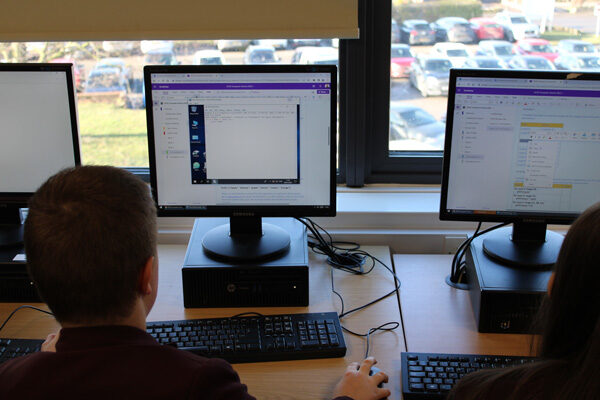
What does it mean to be a computing student at Alsager School?
I would say it is a significant commitment. It requires a large subject interesting and the ability to motivate yourself to work independently and whilst that is daunting it is a real privilege to be able to learn how to project manage and work on your own ideas whilst having support nearby.
There is quite rightly an importance placed on coding ability and the ability to think logically, computing provides the opportunity to develop these skills. There’s also a large element of research and finding existing solutions to problems, the ability to read and understand other people’s programs is instrumental in developing your own knowledge.
The freedom you gain at A-level computing with your programming really allows for the ability to learn how you like to. The project you’re required to do as a part of the A-level is a fun yet challenging task – you have to work on something yourself, from scratch, designing, planning and testing yourself. To be a computing student gives you the freedom and ability to learn and focus on what interests you specifically, which is a wonderful feeling. (Year 13 student)
How do we challenge you in Computing?
By nature, computer science is a very challenging subject. It involves many areas from how computers functions to how to operate in one. Due to this, the subject is inherently difficult, but is very rewarding. The skills you gain by being challenged will aid in life and feel very fulfilling acquiring.
Again, many concepts and projects are a challenge, requiring students to be able to construct and document a functioning system within their ability, whilst also increasing their ability concurrently. This is definitely a struggle, but I believe there’s nothing more satisfying than that “ah ha!” moment when you get a program to finally run, or you fix that annoying bug.
I have developed my skills regarding coding, computer hardware and everything else in between. But more importantly, I have learned how to be more resilient in my work and come up with simple solutions to complicated problems, in and outside of the classroom. The challenging and mentally straining tasks have shown me what I am capable of and have made me a more well-rounded person and a better worker. (Year 12 student)
What skills have you gained/developed in Computer Science?
You are granted freedom in what you do for many projects and tasks, which really helps to develop independent skills. Although you might not think it, there’s a massive amount of personalisation and customisation possible.
Through this, you develop your ability to research, and recognise credible resources. You also develop your coding ability significantly, as nearly all aspects of computing can be related back and forth and can be worked with logically, which leads me to the next skill. Logical thinking and problem-solving: a hugely valued skill in the working world. Computing helps really improve your thinking and problem-solving ability, which will be greatly applicable in the future.
The ability to decompose massive problems into workable steps is another skill. Many people rightly feel overwhelmed by the thought of a huge project, however being a computer scientist teaches you how to abstract unnecessary information and devise a very manageable and scalable solution step by step.
You learn all sorts about the world. Due to the nature of the subject you end up consistently looking into contemporary topics, with the course needing you to be aware of current affairs, legislation and technology, you are always up to date on happenings. (Year 13 student)
How do we make you enthusiastic about A-level Computing at Alsager School?
Often in lesson, before we are taught anything, we are given some sort of real-life example or scenario (usually from BBC news) that helps us understand the topic that we will be taught in that lesson. This helps drive enthusiasm and interest in computer science as it helps students relate the subject to real world application and build up their experience in technology use cases and developments.
Having the freedom of your own virtual environment at A-level is a big positive. It grants you that sense of reward – you’ve been given the privilege to work how you want to and try out different software. Personally, I find computing a very interesting subject, and with the large jump in depth from GCSE it helps to maintain enthusiasm as you always learn something further about a topic you already thought you knew about. It’s a great feeling, opening doors to new areas., it allows for you to make connections, and presents opportunities to research and further your knowledge between these areas and preparing you for future topics. (Year 12 student)
What made you choose Computing?
I have always had a large involvement in computers, and they have always interested me. Immediately after picking up computing, I realised just how much more sophisticated it is. It opens up another world to an area I was already so passionate about, it can be challenging to stay up to date with latest developments but that just sparks my interest to keep learning.
Another example of great skills being taught is learning about the components of a computer and what makes them useful or efficient, as this allowed me to know what I am looking for when upgrading my current PC or family members computers at home. (Year 12 student)
What advice would you give to a GCSE student who is considering taking it at A Level?
Be aware of how much of a step-up it is from GCSE depth-wise. It is more demanding, but a lot more rewarding. I would certainly recommend it and believe it’s incredibly interesting. I would suggest if you’re interested to take it; make sure you’re up to date on the subject news and brush up on GCSE knowledge, since computing is one of those subjects where, as all areas are integrated and reference each other, your foundation knowledge is really important to your understanding of future topics. (Year 13 student)
What is it like to be a Drama student at Alsager
“Imagination is more important than knowledge. For knowledge is limited, whereas imagination embraces the entire world, stimulating progress, giving birth to evolution.”
Albert Einstein
Drama is taught from Key Stage 3, through to GCSE and A Level at Alsager.
The purpose of the subject is to:
- further life experiences, make links with the curriculum outside of the classroom, helping them to understand themselves and each other.
- help students cover moral, spiritual and academic learning which stretch and challenge, allowing pupils to reflect, assess and set targets.
- introduce a range of styles, techniques, and strategies, where they can respond, create and express themselves.
- encourage students to grow in confidence where opportunities are provided for a range of group, paired and individual opportunities which encourage initiative, group skills and independent learning.
- encourage participation in extra-curricular and events which link to the wider school community.
- create cross curricular links with other subjects
- encourage each student to meet their potential
- develop independent learners who can investigate, explore and research.
Mrs S Wise – Head of Drame
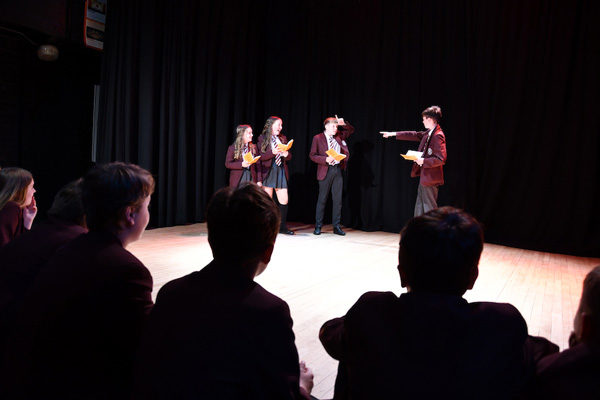
What our students say about Drama:
What skills have you gained/developed in Drama?
At Key Stage 3 I have developed a range of skills both practical and theoretical. I learnt social skills and have worked with new people and formed new friendships. I can structure a piece of practical work collaborating with others to problem solve using communication skills. I am able to present and perform a role using speaking and listening skills or characterization, and finally I can evaluate a performance by analysing and evaluating key moments in a Drama.
How do we challenge you in Drama?
We are encouraged to be brave and take risks, to try something new and work with different people. Through working with different people and situations practically we learn, by not going in straight lines we can go in different directions to find an outcome, which is a great experience.
How do we make you enthusiastic about Drama at Alsager School?
The staff make learning fun and give you confidence to participate. We explore topics that are relevant and use transferable skills that help in other lessons.
What is your favourite thing about Drama at Alsager school?
Definitely extra-curricular, including trips to the theatre and the school show, because this is really where the classroom experience really comes to life! There is no better feeling than the buzz of a performance going on a creative journey with a show.
Drama is one of my favourite subjects at school because it gives you the opportunity to get outside of your comfort zone and you have fun. It teaches you many skills that are useful in other subjects and gives you confidence. Throughout Drama you get to work with people and create performances, you also get to do theory which involves learning all about productions and theatres. Things that challenge me during Drama is remembering to make a script come alive and make it more individual to me. I think that Drama should be in the curriculum because it teaches you many things which you can use in other aspects of life such as public speaking.
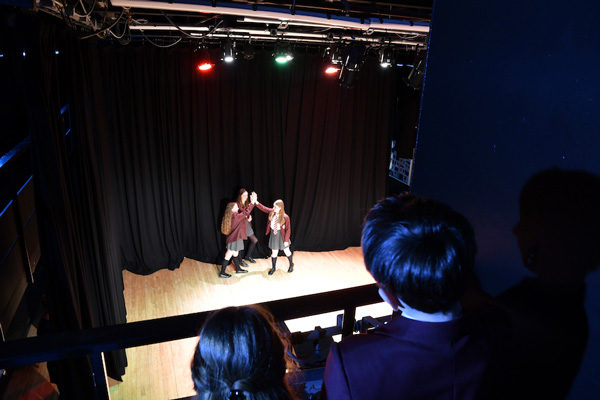
What is Drama like as an option subject?
I love drama and I think you will too. In Drama we study Billy Elliot the musical and Blood Brothers for GCSE, but you do much more before then like physical theatre. I enjoy Drama because it gives you an hour to be yourself and not feel judged, it also gives a space that you can feel free from the stress of other lessons. There are things in Drama that myself and others can find challenging, and these are: doing things out of your comfort zone, learning to work together in teams and performing in front of an audience. However, Drama should be a part of the curriculum for students to learn because it if fun and offers many skills along the way. Skills such as, confidence, public speaking, teamwork and resilience.
What it is like to be an A level English student at Alsager School
The English department offer A levels in both English Language and English Literature. We have included a short summary of what you can expect to find on these 2 courses and also the views of some of our current A level students.
English Language A level
A Level English Language will enable you to study a wide range of texts from a range of time periods. It allows you consider different approaches of analysis and you will be able to apply the views of a range of theorists as well as contributing your own ideas and beliefs on the English language to analytical essays. Furthermore, there are various elements of creativity included within the course which are tested both in the exam and in the coursework components. You will be able to study the language in real world contexts for example, what impact has technology had on the way we speak? How do children learn to acquire language? Is our language gendered at all? This A level offers you fresh perspective on the English language.
English Literature A level
Do you love that feeling of getting lost in a great book or the feeling you get when that analytical point just clicks? A Level English Literature involves the study of a wide range of texts, including prose, poetry and plays, so a love of reading is a must. Students will study Shakespeare’s ‘Othello’, Arthur Miller’s ‘Death of a Salesman’ and a selection of John Keats’ poetry through the lens of Tragedy (Paper 1). Students will also study a range Crime Writing (Paper 2) such as Ian McEwan’s ‘Atonement’ and Coleridge’s ‘The Rime of the Ancient Mariner’. Students are expected to read widely outside of class. This course will allow you to explore, discuss and analyse a wealth of writers and engage with their views as well as offering your own interpretations on key moral matters.
Mrs Martin (Curriculum Leader for English)
How is the A level different to GCSE English?
“The main difference is that we get to delve into the underlying philosophy of how the language works, what it’s about and how it got to this point.” (English Language student)
“It’s so different from the GCSE. We look at the language itself, how the language has formed, why it has formed and even how children acquire it.” (English Language student)
“While GCSE explored certain genres at a specific point in time, A level allows you to explore the changes of crime and tragedy texts as the era of the text’s publishing is essential to shaping meaning.” (English Literature student)
How do the skills developed across your A level literature and language course help support other subjects you do?
“English language requires patience to learn a range of terms and theory, but It has taught me to see things from a different perspective.” (English Language student)
“By taking both Englishes at A level, the language skills I have developed in English language have helped me to create a much more focused, in depth analysis for literature. Alongside this, the context I have studied in literature can give you a greater understanding of history and a much clearer base for analysis in a variety of other subjects. (English Language & Literature student)
“Both language and literature have given me the ability to understand language within different contexts and I feel this will really help me in later life eg: in the workplace.” (English Language & Literature student)
What makes English such an interesting A level?
“Through the wider reading we do, I’ve learnt a range of research skills that I can apply to my other A level subjects. English language does not just endorse learning in the classroom but also gives you the skills you need for independent study at university and beyond.” (English Language student)
“The uniqueness of our language interests me. How language can differ from one person to the next through accent or gender or even just their physical context.” (English Language student)
“The fascination with English literature come from the opportunity to explore the expertise of some of the world’s most talented writers. Especially within plays like Othello and Death of a Salesman, the hidden meanings behind some of the writer’s most subtle decisions make English literature such an interesting A level.” (English Literature student)
What made you choose English A level?
“Universities seem to like the fact that I study literature as the depth of analysis required helps prepare students for subjects such as law.” (English Literature student)
“I run my own blog so the opportunity to learn how to shape meanings through language made this course an easy choice for me. I wanted to learn how to use language to best express my opinions.” (English Language student)
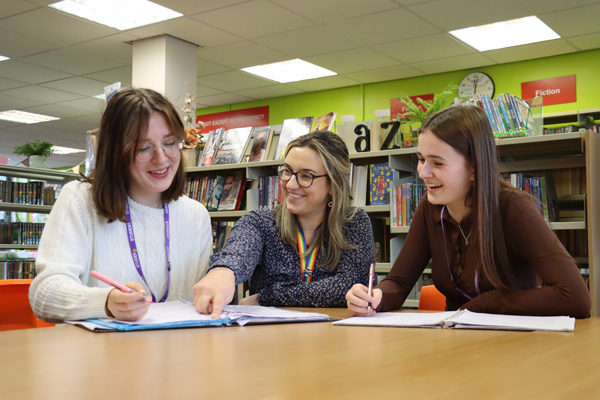
What it is like to be a Fashion Student at Alsager School
Fashion: Students learn about the ‘design and make’ process using an iterative design approach and they are encouraged to consider the work of past and present designers in order to inspire their project work. Fashion at Alsager is about being creative, unique and coming up with fresh, new and innovative ideas.
Studying Fashion at Alsager School gives the students a chance to access information about all Design and Technology subjects; students are exposed to a breadth of knowledge including new and emerging technologies, design strategies and material areas such as woods, plastics and metals. Students also learn information linked directly to fashion and textiles including construction, manufacturing processes, and fibres, yarns and fabrics.
We ask students to question existing fashion products and designs, considering how they can be developed and improved. Students know the importance of seeking other people’s opinions and feedback in relation to design and practical work and they are taught how to use this information to make improvements to their own work. We also challenge students to learn a range of complex practical skills such as applique, patchwork, heat transfer printing and give them opportunities to embed this into their own projects.
I love teaching Fashion at Alsager School, I get to see the students being independent, creative and challenged in so many ways. It’s great to see how students develop their knowledge and skills and how proud they are when they produce great quality work. I love showing the students that making mistakes is all part of the learning process.
Mrs Howard (Textiles teacher)
What does it mean to be a Fashion designer at Alsager School?
“It means stepping outside my comfort zone and using different techniques that I wouldn’t use outside this subject”.
“To be a fashion designer at Alsager School means to respect other student’s ideas and feedback given. Also, to be creative and unique and not to worry if you make a mistake”.
“To be a creative individual who respects, and is resilient towards, other people’s opinions. To learn about new and emerging technologies and the sustainability of fashion”.
(Year 10 students)
What skills have you learned in Fashion?
“To create different types of research and market research to develop ideas”.
“Different sewing techniques, how to set up a sewing machine and how to experiment with the machine”.
“To help others if they need it”.
(Year 10 student)
How do we challenge you in Fashion?
“Teachers encourage us to take the harder pathway but without making us feel uncomfortable”.
“We are challenged by making us question our designs, ‘why are you doing that?’ and ‘how will this develop in the future?’”.
(Year 10 students)
How do we make you enthusiastic about Fashion at Alsager School?
“Teachers help us with our decisions and support us”.
“The teachers make us enthusiastic and the lessons are fun. We can use our own imagination to influence our designs. All lessons are different, not everyone is the same”.
(Year 10 students)
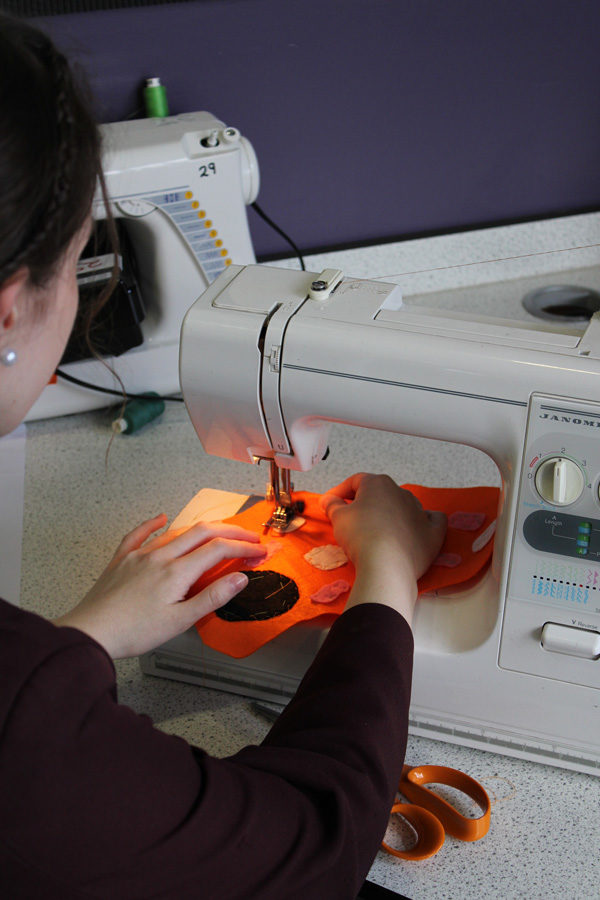
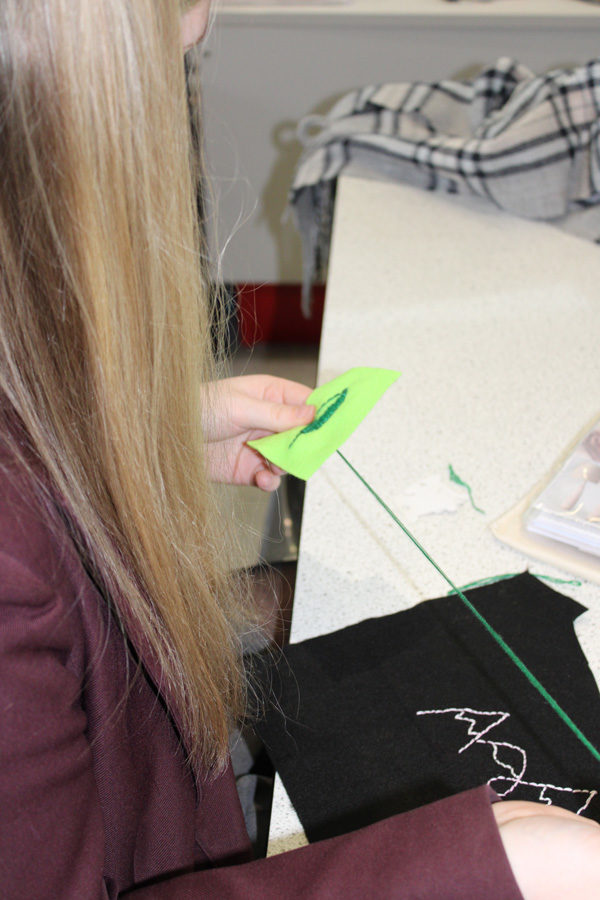
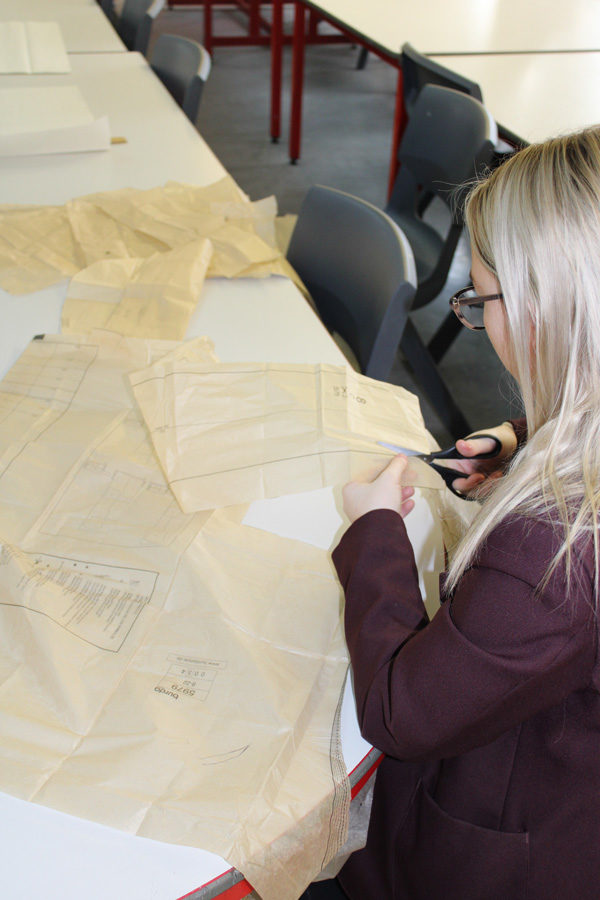
How do you get to use the practical skills taught to you in Fashion, and how do they help you?
“They can help us outside school if we want to create things by ourselves at home”.
(Year 10 student)
What knowledge do you learn in fashion and how does it help you?
“You learn about different companies which helps you understand their thinking and how they have developed their product. This helps us to do the same with our products as we go through the same process of developing it and using market research to influence our decisions”.
“You learn about the sustainability of fabric and the effect on the environment, making you more environmentally aware and friendly”.
(Year 10 students)
What is like to be a Geography student at Alsager School?
At Alsager School we pride ourselves on offering a varied and exciting curriculum across all key stages ranging from ‘How Has Humanities Changed the World’ in Key Stage 3 to ‘Challenges of an Urbanizing World’ and ‘Hazardous Earth’ in Key Stage 4.
For me the most exciting aspect of our Geography curriculum, is the ability to relate everything we do to the world around us. We encourage students to learn outside the classroom, be that on school trips to conduct fieldwork or microclimate studies within the school grounds. There has never been a more important time to understand the world around us and the impact we can have on it.
So many of the world’s current problems boil down to geography, and we need the geographers of the future to help us understand them. Global warming, sustainable food production, natural disasters such as earthquakes and tsunamis, the spread of disease, the reasons for migration and the future of energy resources are just some of the great challenges facing the next generation of geographers.
According to Michael Palin, former President of the Royal Geographical Society, “Geography illuminates the past, explains the present and prepares us for the future. What could be more important than that?”
Mrs D Coxon
Head of Geograhy
When thinking about Geography at Alsager School we asked a range of students in years 7-9 for their ideas.
What does it mean to be a geographer at Alsager School?
To me being a geographer at Alsager school means being able to gain knowledge about different countries, not just where they are but to try to understand why, how and what each country could do to improve their development. It also means to gain knowledge about my own country and learn about things I wouldn’t usually learn in other lessons.It also means to be part of an eco-friendly, ready to learn community. You will love being an amazing geographer as you can tell all your friends and family about it!
What skills have you gained from studying geography?
I have gained many skills such as being able to explain why land is shaped as it is using different methods of learning. I have also know what countries need to do to develop and that not every country has the same developing dynamics.I can read maps, know lots about population, immigration and emigration. I know more about the impacts of climate change, viruses, and how over-populated our world is becoming. I have learnt so much.
How have your geography lessons helped you to understand the world around you?
My Geography lessons have helped me appreciate the world around me and different ways of looking after it. It has also helped me appreciate different countries and their different life styles.
They have helped by explaining what really happens, for example, how does being poor mean that you are more likely to have more children, relate to no pensions or little pay? I have learnt to take more care with the world as there is only one. I also learnt about lots of different countries and how they live.
How have you been challenged in your Geography lessons?
I have been challenged by being given different questions to answer and different case studies to explore. I have been challenged in my Geography lessons in many different ways, one of which was when I studied maps. I found it difficult to remember all of the symbols and what they meant. You have the choice of different tasks in lessons. I think that you should always challenge yourself and go for the hardest one!
What have you enjoyed the most in Geography?
I have enjoyed learning about development dynamics and the way they effect each country and the people that live there. I have also enjoyed the case studies of each country. I enjoyed it when we had to make our own island. We had to draw a map, then put grid references in and directions as well as write a story to go with it. I enjoy learning lots of different things about the world and the environment. I also liked learning about how other people live. It is all very interesting.
What do you know now that you didn’t know before studying Geography at Alsager School?
I know different ways rivers form and how countries develop. I also now know different types of volcanoes and where earthquakes form. I did not know anything about the spread of disease or population control. I had not studied maps, floods, the capital cities of lots of different countries. Everything really.
What it is like to be an History Student at Alsager School
History is an exciting and diverse subject that we explore in Year 7, 8 and 9 by looking ‘through the microscope and through the telescope’. Each year begins with an overview of the key themes of the chosen time period; finding out about discoveries, personalities and key events. We look far and wide to find the key features of each historical period, introducing students to new ideas and concepts.
We approach Key Stage 3 in a chronological order, giving pupils a keen sense of change and continuity. In Year 7 we study conquest and control, medieval realms, the Tudors and the English Civil War. We continue our journey through the past in Year 8 with slavery, the British Empire, the Industrial Revolution, winning the vote and World War I. Finally, in Year 9, we consider the ‘Roaring 20s’, World War II, the Holocaust, the Cold War and protest campaigns since 1945. We consider history from both a British and world perspective, not only helping students to understand the past but allowing them to look at the world around them in a considered way.
We are proud to be a subject that promotes diversity in the curriculum, and allows students the opportunity to consider big issues that have had an impact on the development of the world we live in. One of the best things about being part of the History department at Alsager school is the discussions and debates in class. Students ask interesting and thought-provoking questions, allowing us to see events from lots of different angles. Our students are kind and tolerant, allowing everyone to express their views and form their own opinions. We use lots of historical sources and study differing historical perspectives, allowing a rich and varied window into the past.
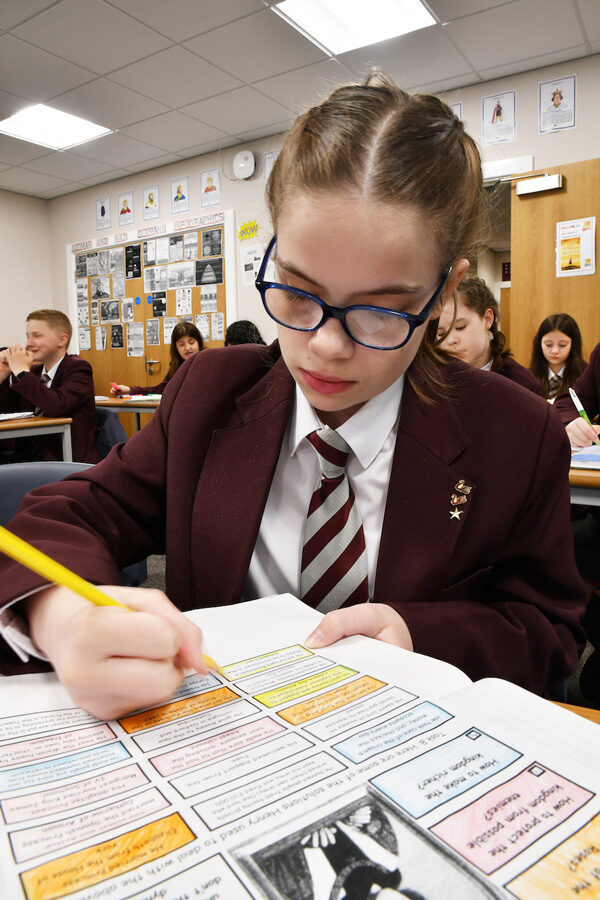
What does it mean to be a historian at Alsager School?
“To be an historian at Alsager School the opportunity to learn about the past in interesting ways and justify your point of view using carefully selected evidence”.
“It gives us an understanding of our past and how our ancestors shaped our future, and why we have the things we do today”.
What skills have you learned in History?
“In History I have learnt how to analyse evidence, present better arguments when putting forward opinions and how a variety of sources can be useful to historians”.
“I have learnt important debating skills and to become more confident when justifying my point of view or interpreting sources. It has also helped to improve my writing skills.”
Why do you learn these skills?
“These skills will not just help us be better historians, they also help us in other subjects. Having a better understanding of history helps with our understanding in other subjects like English and Art”.
How do we challenge you in History?
“Our teachers challenge us by encouraging us to be independent and find the information for ourselves from historical texts and videos. This helps us to remember it better as we have found the information by ourselves”.
“Our teachers always ask us ‘why’ or encourage us to justify our opinion, therefore extending our answers”.
How do we make you enthusiastic about the past?
“They make us enthusiastic about the past by letting us interact and find our information in new and creative ways”.
“The teachers find ways to incorporate interesting topics, events and individuals into our History lessons. They encourage us to think like historians”
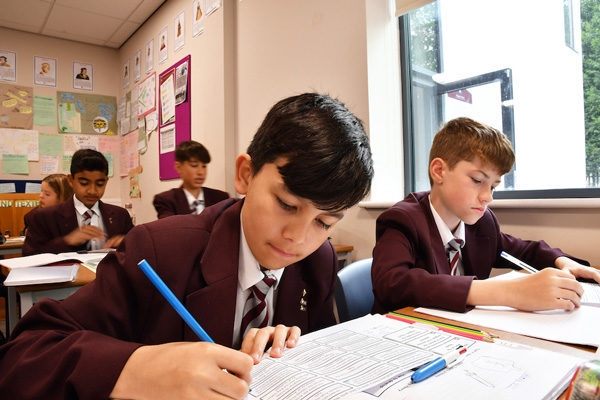
What is it like to be a Mathematics student at Alsager School?
“Nature is written in mathematical language.” – Galileo Galilei
Patterns appear in so much of what we see around us. As humans we seem to be attracted to these patterns and have developed mathematics to explain all that we observe. Whether it is studying the geometry of a snowflake, explaining how the stock market reacts to global events or making music that appeals to our ears, mathematics underpins so much of our world.
At Alsager we challenge students to gain a deep lasting understanding of mathematics. In Key Stage 3 we follow a teaching for mastery curriculum. Rather than merely learning procedures we encourage students to share their ideas and develop the rules we use. We use a variety of methods to learn including lots of hands on activities. Students feel safe to make mistakes and reflect on these to gain a greater understanding. We challenge learners to question why they follow certain mathematical rules and to apply these rules to solve complex problems.
Our focus on reasoning and problem solving continues into Key Stage 4 giving students the skills they need to think critically about the problems they encounter as young adults in their chosen careers. In Key Stage 5 we offer A level Mathematics and Further Mathematics. Within these subjects, students study pure mathematics alongside statistics and mechanics.
I love teaching Mathematics because it gives students so many of the essential skills they will need in their life. Many students will go on to work in fields relying on maths, but all students will also use lots of what they have learned in everyday situations like choosing how to organize their personal finances or thinking critically about the statistics they read in the media. I also love to see the passion so many of our students have for maths. Our students are willing to try a difficult problem where the method is not immediately obvious, and I enjoy sharing the sense of achievement they feel when they have explained their solution clearly.
Mr Askew (Teacher of Mathematics)
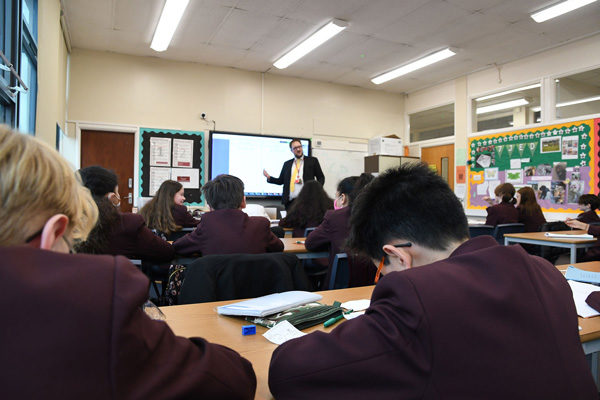
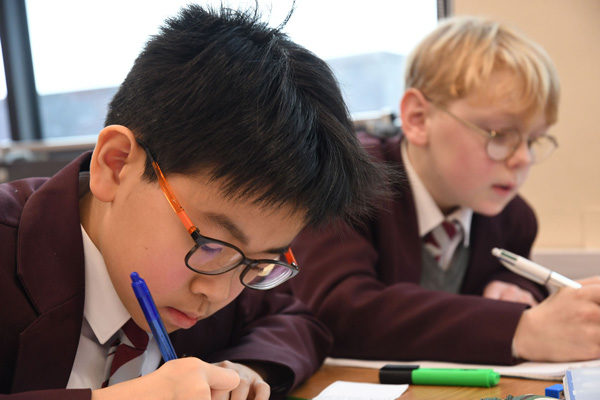
What does it mean to be a mathematician?
It is challenging but ultimately rewarding, as while a complex equation or question can seem initially daunting, there is great satisfaction to finally working your way through to the correct answer, it’s all about that aha! Moment when you work out the solution. To be a mathematician requires the ability to decompose an initially complex problem into more manageable and comprehendible chunks. Unlike many other subjects, each question is unique in the precise details but often similar in nature and calling upon a familiar skillset; however, the most difficult part of maths is working out the techniques and skills that you need to apply in order to properly work to a solution. Most mathematicians can start with the same problem and reach the same final answer, but using completely different methods and so being a mathematician involves being clear in your working, thinking through a problem in logical stages and making sure your thoughts and small workings-out are documented down so you, a friend or an examiner can quickly trace back the steps you have taken to identify any mistakes easily. (Year 13 student)
To be a mathematician, you need to be resilient and a thinker. You need perseverance and good problem-solving skills. It means to be able to face problems and thinking about them in a three-dimensional way. (Year 11 student)
We use our imagination and mathematical thinking skills to analyse and breakdown problems before solving them. (Year 10 student)
It means to think differently and creatively, while respecting other methods and ways (Year 10).
What skills have you gained in Maths?
Two skills that have improved for me exponentially while doing A level maths are problem solving and resilience. This is because throughout the course there was a constant requirement to decipher key information from long questions and the challenge of learning a plethora of new, difficult skills definitely improved and tested my resilience. Problem solving is a really useful skill to have because it can be used in many different situations. Developing my problem solving skills really helped me with all aspects of my studies, by allowing me to draw upon certain parts of my knowledge as and when I needed to. The ability to think logically goes hand in hand with problem solving and is something that’s taught throughout GCSE and A-level. (Year 13 student)
As mathematicians, we are constantly learning new skills and concepts. We also learn to connect different topics like Numbers, Algebra and Statistics and how well they all fit together. (Year 9 student)
We develop appreciation of learning new methods and practicing them in class which is a safe space to learn for us. (Year 9 student)
I have gained confidence in facing challenges and problems. I am not afraid to try and if I get it wrong, I can try again. I am more resilient now. (Year 10 student)
How are you challenged in Maths?
You are challenged in maths by the perpetual demand to learn new skills and equation and to apply these to questions and problems as part of your independent study. You are continuously encouraged to try different ways of working, or to tackle a problem using multiple techniques with the aim of getting the same answer. The answering of proofs in mathematics is especially challenging since it requires you to articulate the methods you are using in a coherent way so that others could understand the thought process you’ve taken. (Year 13 student)
There is often extension to go onto that makes you think differently and challenges you. (Year 9 student)
Sometimes we discover and explore our own way through maths, and I really enjoy that. (Year 8 student)
We do these maths challenges sometimes that are tough but fun. When there is timed work as well, it helps us to think under pressure. (Year 8 student)
How do we make you enthusiastic about Maths?
Alsager makes you enthusiastic about maths by ensuring you know the practical applications of your study while also creating a supportive and ambitious environment which encourages you to challenge yourself with the hardest questions in order to further yourself as a Mathematician. The specific focus of learning by mastery is incredibly important since developing your all round understanding of a skill makes it so much easier to apply to new scenarios. Techniques such as undoing a solution, filling in the gaps in a method or creating problems for your peers is not only fun but also very stimulating in allowing you to quickly patch holes in your own working. (Year 13 student)
Our teachers are very enthusiastic about maths and we can’t help but feel excited too. (Year 8 student)
Being praised for thinking mathematically and being creative makes us feel proud and excited about maths. (Year 9 student)
A supportive teacher alongside a positive attitude before starting a question. (Year 7 student)
Changing the format of the lesson from time to time e.g. tiles, booklets, group exercises and games. (Year 8 student)
Putting maths in real life situations and involving food into the problems. (Year student 7)
What is it like to be a Media student at Alsager School?
Media Studies is an increasingly developing and evolving subject, it covers a range of different aspects of study exploring areas of design, theory, research, and business. Our subject enables an individual to look at the world through a completely different perspective and is massively linked to culture and the ongoing zeitgeist. Literacy is at the heart of the subject – this is both visual as well as in the written word -but it can be in varying forms from print, film, broadcast and online.
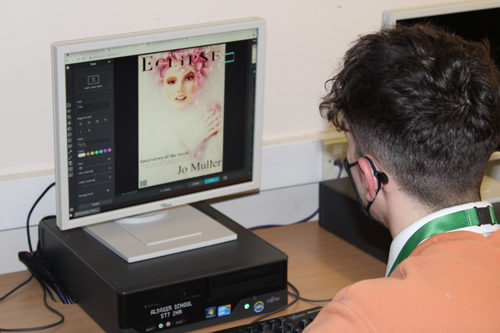
Our students gain a range of skills and go on to have very successful careers in a plethora of fields. Most of candidates end up studying the subject at University in some form and have commented on how they have developed their communication, professional and organisational skills through the course.
Whilst the subject is currently only offered at post 16, there are many aspects of Art, Design, Music, Literature and Business that will enable a student to join us with confidence having studied these subjects ay KS3 and KS4.
Studying Media provides a range of lifelong skills that supplement a range of different subjects, courses and roles.
Improving Literacy – Media as a subject utilizes many of the same skills required to read. Evaluating a media text seems less challenging than a Victorian novel or Shakespearean play. It extends and develops vocabulary our students are introduced to new terminology that often appears in other subjects such as English Language and Literature, Psychology, Humanities, Art, Business Studies, IT and Design and technology to name a few. Literacy is also improved due to producing coursework that evaluates and analyses.
Developing cultural capital – as a subject Media is highly contemporary and requires a detailed understanding of how media communicates to us in the wider world. We look at stimulus from across a range of media platforms including film, television, radio, print and new media from the web. Media studies gives students the necessary tools to negotiate and evaluate the world around them as well as developing a more concrete sense of self.
Vocational skills and context – As a subject that links directly to an industry (one that is increasingly evolving and becoming an integral part of the world we live), Media studies gives students the chance to have awareness of specific skills that relate to the workplace. This can range from pitching or presenting an idea, planning, drafting and managing a project, exploring finances as well as becoming aware of institutions and business that produce specific media products.
Developing ICT skills – The subject requires pupils to embrace modern technology in lots of ways, using a range of IT programs such as word processing and presentation software as well as video and sound editing software.
Highly Academic – Media studies pulls on many different theories and theorists that range from linguistics, psychology, sociology, literature to name a few. In fact, those who have not studied the subject might not be aware that it has a thorough grounding in theory. We explore topics from a historical, theoretical, and practical way which helps to develop different ways of thinking as well as linking across prior knowledge bases. Theories on semantics, genre, audience, representation feature and are key to helping achieve the higher grades.
Continuous Assessment across a range of platforms – Students will be assessed through both exams and non-exam assessment which provides an opportunity to develop a range of skills necessary to be successful on the course. Assessment is both practical and theoretical, so it enables those with a more practical approach to a subject to build confidence in an accessible subject.
Overall, Media studies as a subject is one that can encourage high levels of engagement, helps develop an awareness and understanding of the world by looking at different aspects of society such as gender, class and general attributes of the zeitgeist. It is both theoretical and practical so is appealing to a wide range of individuals.
Mrs Carney-Cox, Media teacher
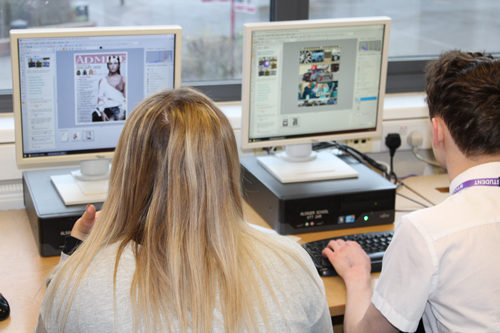
What does it mean to be a media student at Alsager school?
Being a media student allows me to show off my creative skills and express them through exploration of well know media industries.
The course focuses on giving a wide and intriguing insight into how media is progressing and constantly evolving as technology develops.
Being a media student at Alsager school consists of working with staff and peers to produce work that is relevant to the current industry and gaining greater knowledge on the change in the media industry.
What skills have I gained from doing this course?
Since studying media I have gained the skills to do independent research on a given topic then deliver a presentation to peers about my research findings.
Other skills I have gained are organisational skills and research skills. A main factor of media is keeping on top of your workload while completing it to a high standard, this allows me to achieve the highest grades I can.
How have you been challenged in your media lessons?
When studying this course, it has made me a lot more aware of how the industry is structured and how social media has become very business driven making me more cautious when online. Additionally, after doing numerous presentations it has taught me many valuable transferable skills that can be used in other subjects.
Skills I have developed include having to voice and create my own opinions as the media industry can be very controversial. You must be able to adapt your mind and look at many different genres and styles giving your opinion and how it can be improved so you can reflect on your own work too. Another challenge is research as this is a large section of the course as you must understand the industry and how it is changing and adapting to new social trends.
Initially, I found that doing independent research was difficult as it was a skill that I had not previously done, however after practicing this skill I feel more comfortable doing it. As well as this, my confidence when presenting my work to peers has increased.
Collating an opinion on topics can sometimes be challenging, especially if you have never been presented with it before.
What do you enjoy most about studying media?
I really enjoy the media course as it allows you to show your creative and innovative ideas on topics and offering you the freedom to work independently. I am also enjoying the content I am learning as it is making me more knowledgeable about the industry that I was not aware of before.
I enjoy the contemporary element about media studies because you learn about topics that are current and applicable to media that we have daily access too. In addition to this, I have really enjoyed exploring how magazines are made and how important the visual aspects are, and I will hopefully replicate this when creating my own magazine.
Analysing different magazines and discussing how they affect different people.
What do you know now that you did not before?
From the start of the course, I have learnt so much that I did not know before such as the importance of target audience as this is key in marketing to find how the product is aimed at and how they will gain profit. I also learnt the importance of magazine layout, fonts, image and could scheme as this is was attracts buyers and investors. Another thing I learnt is how quickly the magazine industry changing and adapting to a more technological industry but converting to digital print.
Since September I have learnt about the rapid growth within the magazine industry, as well as having the ability to create my own digital magazine cover about a topic that I am interested in.
The media influences your day-to-day life a lot more than you think. It is heavily involved in the decisions you make and why you choose to make them. A lot of the time it is sub conscious and you do not realise that is has impacted your choices.
What is it like to be a Modern Foreign Languages student at Alsager School?
From their arrival at Alsager School, all students will study at least one language in Year 7, either German, Spanish, or French. We give students opportunities to develop their language with a focus on the four main skills of listening, reading, speaking, and writing. Students will develop the ability to form language correctly, by learning about grammar formation and phonemes. Students will be able to produce language in past, present, and future tenses.
Students learn a wide range of vocabulary in the target language, with topics often chosen based on what is relevant for young people in society. Students learn about sports activities, school life, technology, environmental issues, and career plans, to name just a few. We also give students language they can use in the real world. How can you explain a medical problem to a doctor? How can you order food and drink in a restaurant? How can you ask for directions to a place in town?
There is also a big focus on understanding the culture and the people behind the language. In KS3 we have a variety of cultural projects, for example learning about the artwork of Salvador Dalí in Spanish, or the history of the city of Paris in French. We also learn about traditions in different countries, like the fascinating festivals that happen in Germany, or the bizarre edible delicacies of Latin America. (guinea pig!) Students who progress further in languages may delve even deeper and get to grips with authentic resources. This could be a German novel, a famous flick from French Cinema, or the vivid world of Spanish music and dance.
I love teaching languages because it gives students access to other cultures. It allows them to consider their identity on a global scale, and how to interact with people from around the world. In an increasingly diverse and developing society, it is more essential than ever that young people understand the importance of global citizenship. It allows students to express themselves creatively by speaking and writing in other languages. Learning languages gives students transferable social and communication skills, as well as a space to develop their confidence with expressing themselves. It can open the door to new career paths and make you an attractive candidate to future employers. I champion learning languages because there is something special and powerful about being able to speak to people from around the world in their own language.
“If you talk to a man in a language he understands, that goes to his head. If you talk to a man in his language, that goes to his heart.” – Nelson Mandela
Miss Howlett (Teacher of Languages)
What does it mean to be a languages student at Alsager school?
“It means to want to learn and respect other cultures. To be a language student shows resilience, bravery, and respect towards what is new and different.” (Year 10 student)
“It means to study hard and try and learn about different people and their language. It means to be challenged but have fun as well.” (Year 7 student)
“To be a language student is an enriching experience that is unique and totally different from all other subjects.” (Year 7 student)
What key skills do you gain/develop from learning languages?
“You become more perceptive and learn to explore questions in depth.” (Year 10 student)
“You learn how to be independent and responsible for your own learning.” (Year 10 student)
“In languages you develop confidence and perseverance to try to get it right.” (Year 7 student)
“You can learn to be sociable and you can get to know people even if they don’t speak English.” (Year 7 student)
Do you think it is important to learn languages?
“Learning languages is vital to make you stand out from the crowd. It gives employers a reason to hire you and not someone else. It breaks down barriers, and the skills you develop learning a language help with everything.” (Year 10 student)
“I think it is important as it helps you learn how other people speak and live and if you go on holiday, you know how to speak part of their language.” (Year 7 student)
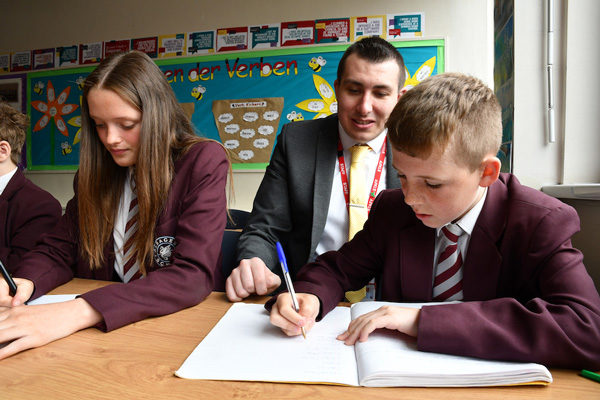
What is your favourite thing about learning languages at Alsager school?
“My favourite thing about learning languages is the dynamic atmosphere in the classroom. Teachers make the lessons fun and friendly, but still get across the information we need.” (Year 7 student)
“My favourite thing about learning languages is when you leave you have learned something you didn’t know before.” (Year 7 student)
“My favourite part of learning languages is the teachers, if I am stuck they will help me and support me to be the best I can be.” (Year 7 student)
“My favourite thing about learning languages is when you leave you have learned something you didn’t know before. Each lesson has its own challenge to tackle, and then it’s a great sense of achievement when you work it out yourself.” (Year 10 student)
What is it like to be a Music student at Alsager School?
‘’Music is a moral law. It gives soul to the universe, wings to the mind, and life to everything’’ (Plato)
We learn how music works through studying a wide variety of musical styles, genres and traditions. By putting sound before symbol we perform works by artists as diverse as Bob Marley to Bernstein, from Stravinsky to Anoushka Shankar, from Bach to the Beatles. All these styles can then be mixed together to compose in our own unique voice. Here at Alsager we encourage everyone to sing and play an instrument, join an extra-curricular club or activity, be creative and come up with fresh new sounds and beats.
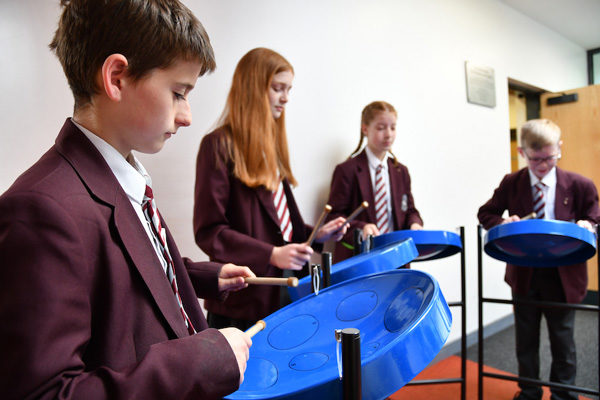
I love teaching Music at Alsager School. There is no better feeling than seeing our students develop as musicians building on their knowledge and skills year on year. Whether performing a blues improvisation on the keyboard, singing in our award winning vocal group or writing a rock song for their GCSE coursework we know it is the quality of the musical outcome that counts, and we know you don’t get there without playing a few wrong notes. For this reason, we make sure that everyone is friendly and supportive of each other. Participation in any musical activity, be it playing sax in jazz band, creating piece on the Taiko Drums in year 8 or composing a club dance remix for your A level coursework, gives you a real sense of joy and achievement. Music enriches the school life here at Alsager, as well as the wider community through the many concerts, workshops as well as our annual school musical which involves all our local primary schools. We see music as a partnership between students, staff, our fantastic instrumental tutors, our local music hub, the Love Music Trust and of course the parents and carers who support us on a daily basis.
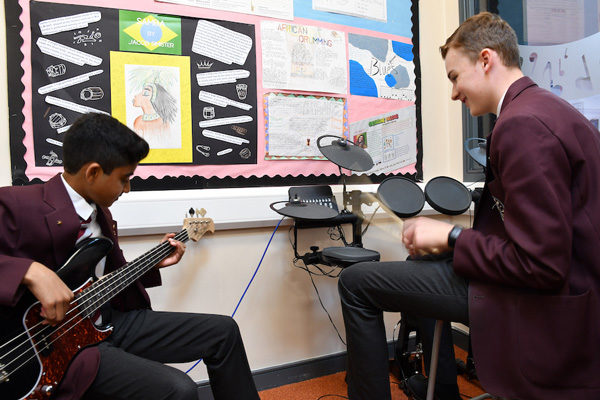
What does it mean to be a musician at Alsager School?
Every lesson is a practical one. I am only in year 7 and I have already played the cornet, keyboards, djembe drums and ukulele. Getting involved in extracurricular is also really good fun. I recently took part in Annie. It was great to be part of such a big whole school production. I made loads of new friends. I was a bit nervous when it came to the big night, but I am so glad I did it. My Mum said it was better than anything you would see on Broadway! (Year 7 student)
What skills have you gained/developed in music?
I have learnt that working together as a team is important. We were playing in a band but couldn’t decide who should play what. Eventually, by allocating roles, letting everyone have a go at each part and not giving up we came to a decision as to what worked the best. Our performance of Price Tag was great! (Year 7 student)
I have learnt to be resilient if I find something difficult. We were recently learning to play reggae music and I couldn’t play the bass guitar part. Instead of giving up I kept practising until I smashed it. (Year 8 student)
I decided to join the choir in the first few weeks and it was great. It has improved my confidence and now I am not afraid to try something new. Not only did we learn some great tunes, but I made some great friends, and then we performed at the MEN at the Young Voices concert with Tony Hadley! (Year 7 student)
How do we challenge you in Music?
There is always another level to strive for in music. Last term we started playing brass instruments. I found it difficult at first but eventually I started to really enjoy it. Miss Waterhouse said I should join the starter brass group which I did. I now hire my own instrument from the Love Music Trust, have joined the school orchestra and joined Lions Brass Band. (Year 7 student)
How do we make you enthusiastic about Music at Alsager School?
Music lessons are always fun and exciting. We are always learning something new. We also have brilliant resources in school. Guitars, drum kits, loads of instruments. (Year 10 student)
Over the last three weeks I have created a club dance remix as part of my composition coursework. Sampling, creating beats, composing harmonies. I can’t believe I have done it so fast but when you have such great facilities it’s like writing music in a professional recording studio. (Year 13 student)
What knowledge do you learn in Music and how does it help you?
Every time we study a piece of new piece of music we learn about the compositional techniques involved. I can then use these techniques to create my own piece. I am currently writing a piece for a jazz band based on the music of Esperanza Spalding. If you didn’t know she is a brilliant vocalist/bassist. Check her out! (Year 11 student)
What is your favourite thing about Music at Alsager school?
When you go down to the music department you can hear jazz, rock, classical, choirs and orchestras. There is something for everyone. (Year 10 student)
Everyone is always so friendly. Students from year 7 through to year 13 are involved in loads of different clubs and activities. If ever I get stuck with a chord or rhythm someone will always help me. (Year 7 student)
We have just started creating dance tracks using music technology which is great. What is really good is that we can go and use the facilities anytime, at dinner time, break time or after school and practise. It is always open. (Year 8 student)
What is it like to be a PE student at Alsager School?
The mission of Alsager School PE department is to foster a lifelong love for physical activity by improving knowledge, developing healthy bodies, and promoting a level of physical literacy which allows students to improve performance over time.
In key stage 3 all learners take part in a range of activities including team and individual games, swimming, gymnastics, outdoor and adventurous activities, and dance. Fitness and how to maintain active, healthy lifestyles are taught throughout all units.
Over the course of their studies students will build knowledge based around the following key themes:
- Attack
- Defense
- Formations
- Playing areas
- Rules and regulations
- Tactics
- Efficiency
- Safety
- Components of fitness relative to performance
Students will have opportunities to develop their knowledge of these areas through practical lessons. Lessons will have a skill focus, relevant to the activity and to enable improved performance over time.
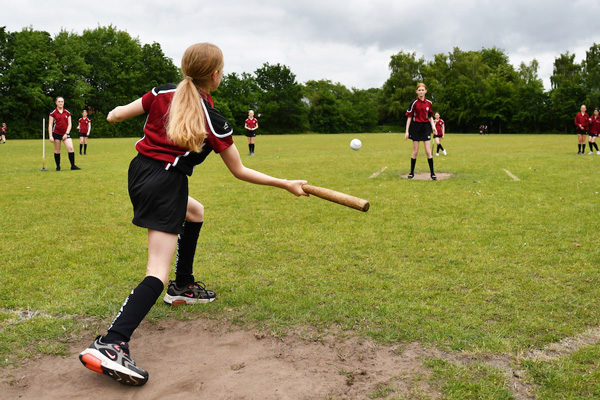
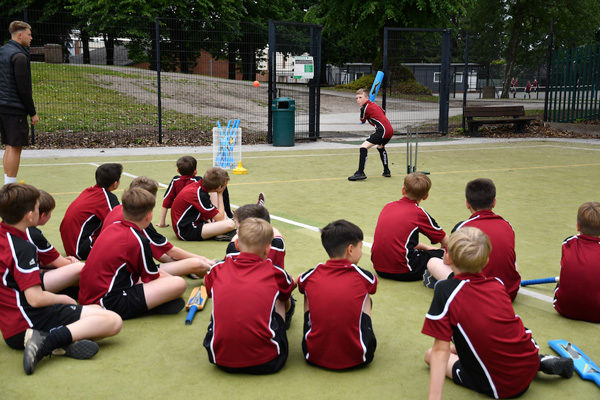
PE has an integral role in developing life skills and personal development, as such, some core skills will overlap the units of work. We expect that by the end of key stage 3 all students can:
- Work effectively as part of a team.
- Understand the importance of physical activity in maintaining a healthy lifestyle.
- Understand the importance of sport in society.
- Demonstrate resilience by acting on feedback and being determined to improve.
- Follow rules and demonstrate the SPIRIT values at all times.
- Be able to swim well enough to preserve life in an emergency situation.
- Use their knowledge from other subjects to, for example, measure and time accurately, discuss trajectory, momentum, gravity, and the importance of being aerodynamic/streamlined.
In essence, we aim to help students to find an activity that they love. An activity that they may continue with outside of school and that ultimately will help them to lead a healthy, active lifestyle.
In Key stage four we offer two pathways: GCSE and Cambridge National. Both are great courses which allow students to pursue their love of sport. Through these courses you can improve your knowledge of anatomy and physiology and how changes in the body contribute to improved performance. We also learn about the effects of psychological preparation for sport and training.
Mrs Dougherty, Head of PE & Performing Arts
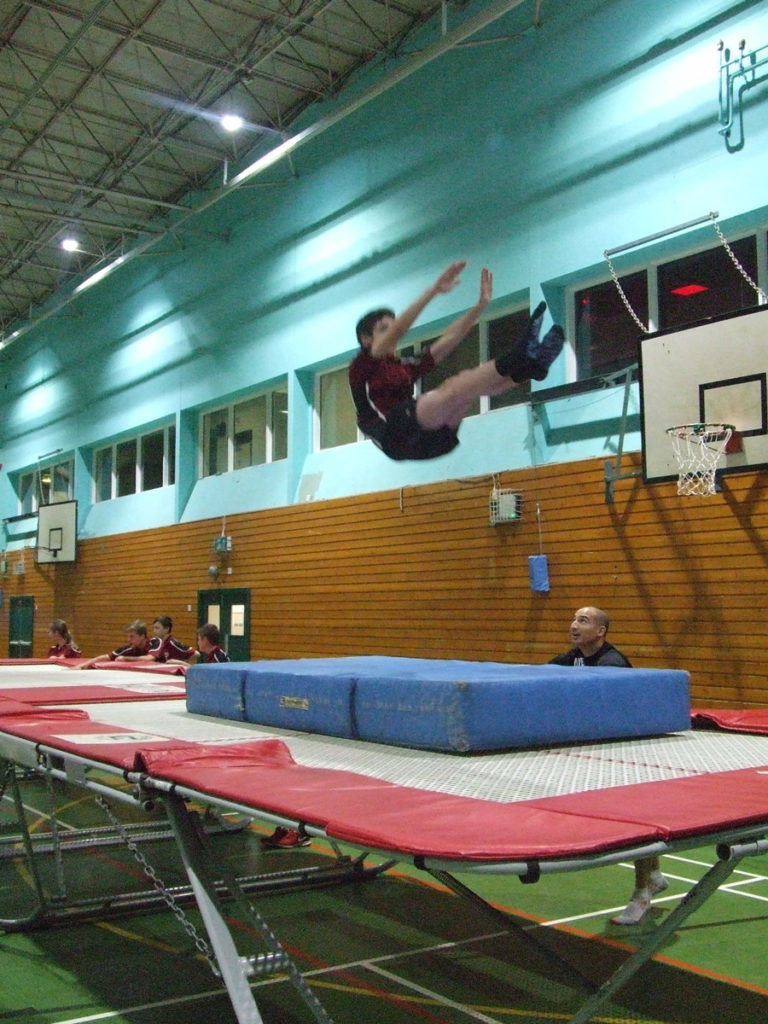
What our GCSE students say:
What does it mean to be a PE student at Alsager School?
“In GCSE PE, you must have some levels of fitness to cope with demands on the practical side of things. However, your fitness will gradually improve over the course, as well as your theory knowledge! PE has lots of options for later in life, such as: Sport Analysis, Physiotherapy, Sports Science and many more. The skills and abilities which you learn will stay with you for the rest of your life. PE compliments Biology extremely well, as many of the things you will study in GCSE Biology – about the human body – you will go onto study in much greater depth in Physical Education.”
What skills have you gained from studying PE?
“I have learnt how to develop my own skills in practical sports, not only through physical skills but mentally as well, like how attitude to sport can greatly affect your performance. I have gained an understanding of the science behind sport including muscles and joints and how they affect movement. I also learnt what revising technique works for me, and how to remember and retain information learnt in class. The teachers help you find a way that works for you so you can achieve the best grade.”
Have your GCSE theory lessons helped you to understand how to improve your performance?
“When I first started the sports studies course in Year 9 I knew very little about the theory side of sport. However, now in Year 11 (after doing the course for almost 3 years) the practical and theory side of the course tie in nicely with each other as one of the topics is about changes of the body due to exercising. You are taught to see physical changes which are happening to your body whilst exercising (this happens during the practical side of things). The course teaches you how you can effectively complete a warmup, cool down and know how to recover from periods of exercise which is vital for preventing injuries and overall improves your performance.”
How have you been challenged in your GCSE lessons?
“The practical lessons can be physically challenging whilst extremely rewarding at the same time. In the course there have been numerous sports which I have done which vary in intensity, but your teachers are always there, watching, to guide you through on how to improve and develop your technique as well as your performance. In the classroom, some of the work can be difficult but it is achievable. There are regular tests over the course and knowledge recaps which require you to revise, however if you do revise and put the effort in, you will be glad. We get set regular homework, whether that be research on a certain sport, revision or finishing work off from class, by developing answers. The homework comes with some challenges but if you are on top of the theory work then you can see your grades start to boost in the future according to the effort which you put in.”
What do you enjoy most about GCSE PE?
“There are a variety of factors which I have enjoyed during the course. The practical side is enjoyable and fun, and there are bonuses. in Year 9 we went to Staffordshire University Sports Campus for the day to be coached by students studying sport with Staffs Uni. More so, the PE department run a sport tour every few years. I travelled twice to Flachau, Salzberg (February 2018 & 20) in the Austrian Alps on the tour and got the chance to film my skiing which contributed to my GCSE PE practical grade. The theory side is interesting, especially the Paper 1: anatomy, fitness and training which interlinks with Biology, so helps you in both subjects!”
What do you know now that you did not know before you studied GCSE PE?
“That PE isn’t just about sports and learning different skills to use in sport but that there’s science behind the sport and how different factors have effect on how you play the sport like lifestyles and even attitudes towards the sport. Also, that there is more to the whole GCSE than just how you play a sport, you can get a high grade still even if you are not the best at practical sports.”
What is it like to be a RE student at Alsager School?
“The important thing is not to stop questioning. Curiosity has its own reason for existing” Albert Einstein
We love to discuss ultimate question in RE; especially ones which don’t necessarily have a single answer. RE at Alsager School covers a variety of relevant and interesting topics ranging from ‘How Humanities has changed the world’ and studying the 6 major world religions, at key stage 3, to debating ethical issues such as crime and punishment and peace and conflict at Key Stage 4. Everything we do in RE relates to the world we live in and the community around us. Students are encouraged to develop and express their own opinions and debate ethical issues in a safe and open environment. It is important to have an understanding different faiths and beliefs and develop an ability to empathise with others, and it is amazing to watch students develop this over their time at Alsager school.
Mrs S Skingle – Head of RE
What our students say about RE:
What does it mean to be a RE student at Alsager School?
“Being a GCSE RE student at Alsager school makes you realise that you don’t need to be religious to have an interest in RE. RE is our favourite subject because it helps you in other subjects like history and English and how to structure exam questions. We always start the RE lesson with a keyword, this helps everyone understand what the lesson will be about. In order to be an RE student at Alsager school you need respect for other religions and what they do. RE is not just religion! Further in the course you also study Relationships, Crime and Punishment which gives you the chance to study the other sides of RE”.
What skills have you gained from studying RE?
“In RE we both feel like we can be ourselves. RE is a chance to relax and still learn but in a calmer environment. It also improves your communication skills with others. Spiritually you feel like someone is there, and helps you through all your worries and problems. At Alsager school, we are lucky because we have RE teachers that make lessons fun but make sure you have a good understanding of the work. RE also makes us feel more organised with our school work. We also feel like we have been kinder to others since the start of the course!”
Have your GCSE RE lessons helped you to understand the wider world?
“Yes, it makes you understand that there is more to the world than just countries and people. There are many different religions across the whole world and we have learnt that you shouldn’t stereotype other people’s religions based on what they look like or where they come from.”
How have you been challenged in your GCSE lessons?
“We are challenged every lesson for deeper understanding of cultures, religions and looking at different perspectives. We are always challenged to look at what we believe as well as what others believe and that is what makes RE such a great lesson, we not only learn about religion but also from religion too. An example of this is studying Christian practices and looking at street pastors, even though I am not a Christian it is so inspiring to see Christians who operate on a Friday/Saturday night and look after people in need. It makes me want to help people and be a better person too.”
What do you enjoy most about GCSE RE?
“There are so many reasons I love GCSE RE. The enthusiasm of the teachers really inspires the class and we get to interact with things like artefacts which really bring religion to life, this year we got to look at real holy water from Lourdes, handle rosary beads and we always watch the best clips for example the alpha courses ran in prisons, you do not realise until you have studied RE the real impact religion has on society and the world. In RE debating is also encouraged which is so much fun, we always feel safe to ask questions. I also really enjoy our book work, there is an extremely high standard and everyone in our class can say that our RE books are the best in the school, I can’t wait to use mine for revision.”
What do you know now that you did not know before you studied GCSE RE?
“Over 1/3 of the world identify as Christian and almost 80% of the world holds some sort of faith. At first I was surprised by this but then the more we have learnt, I can see how religion affects everyone’s life and religion is all around us. It definitely doesn’t matter if you are religious or not, we all have something to learn from it and that is that makes RE different to any other subject, your views always better and there is no such thing as a wrong question to ask.”
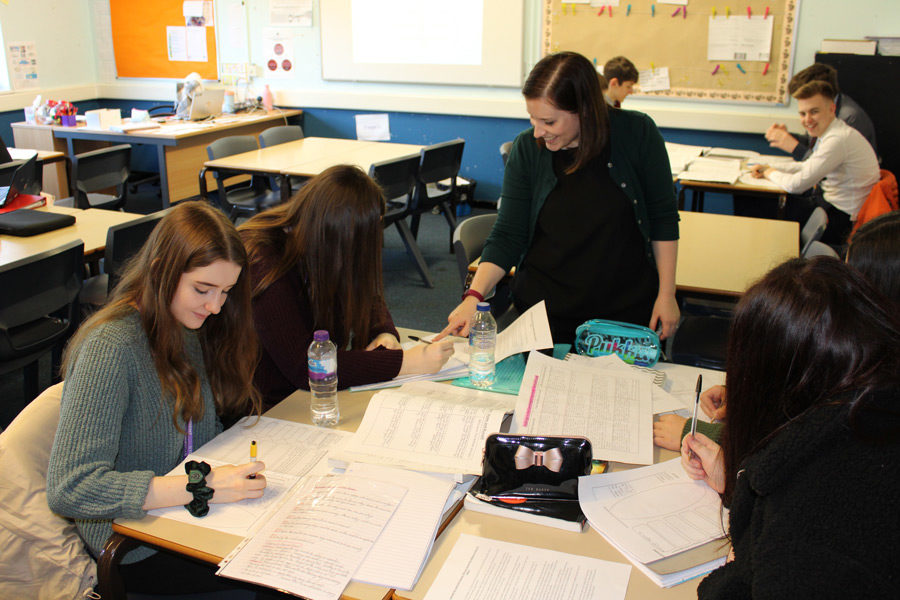
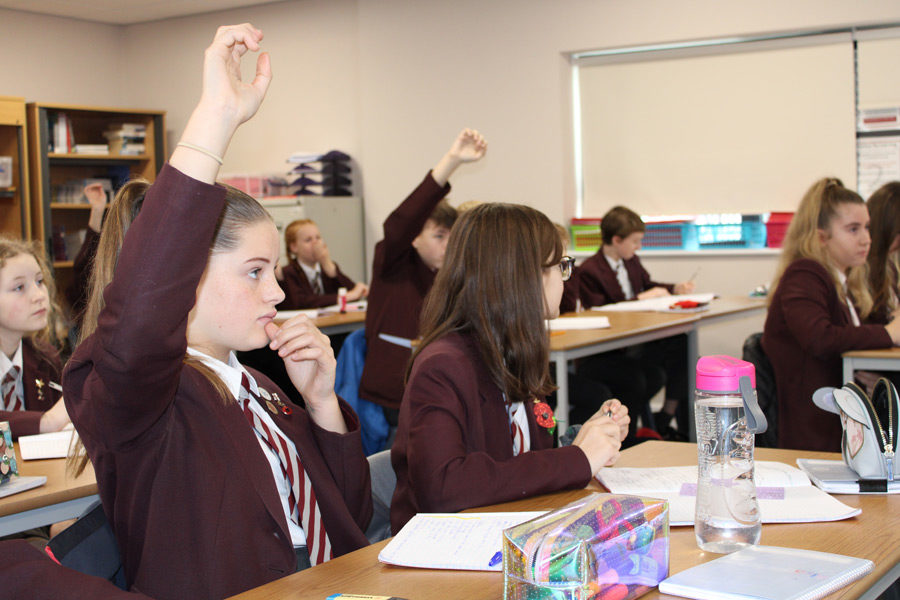
Science is about discovery. Science is about questioning. Science is about investigating. We aim to encourage our students to be inquisitive and question everything around them in everyday life.
Science is such an exciting and important subject and has never been more important than right now, during a world health pandemic. Over the last year we have seen so many scientists, from across the world, working to develop vaccines against covid-19. Science is also an incredibly varied subject and during half term, many of us watched on excitedly as the Perseverance Rover landed on Mars to search for life and investigate the possibilities of human colonisation.
Our new KS3 topics allow us to address important questions and develop student’s knowledge of the variety of careers related to science. Examples of topics considered include: Is it possible to live on Mars? Why are bees so important to life on Earth and how can we protect them? What is the science behind fireworks or rollercoasters? What does a forensic scientist do?
During KS4, students will study AQA Combined Science (Trilogy) or triple science. Key skills are developed throughout the course including selecting and using experimental equipment and planning methods. They develop the ability to collect, analyse and evaluate data. Many of these students develop a passion for the subject and we are truly privileged to have large numbers of students who choose to continue to study science at KS5. We offer A level Biology, Physics and Chemistry and the Extended Certificate in Applied Science. It is lovely to hear from past students who have completed degrees and found employment in science related areas.
Mrs E Riding – Deputy Curriculum Leader for Science
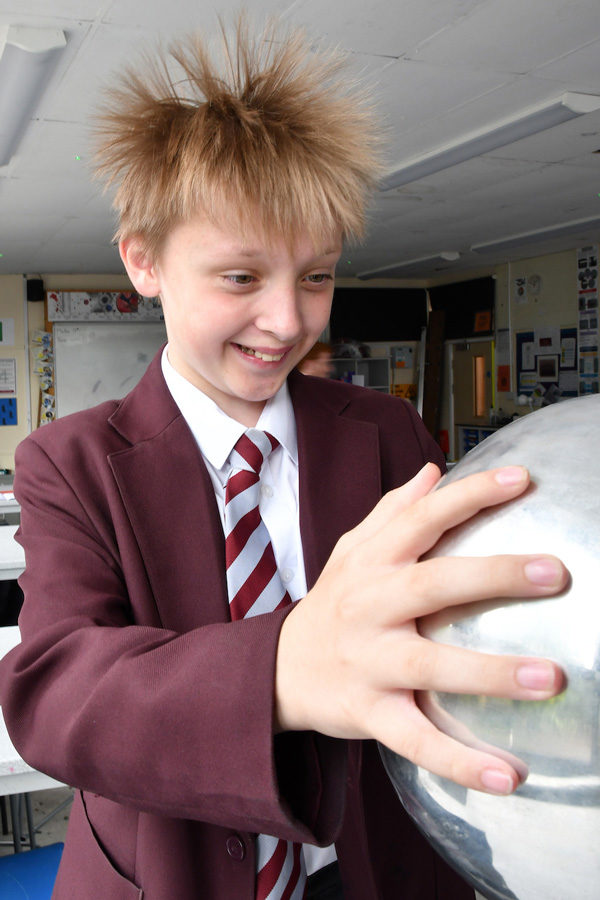
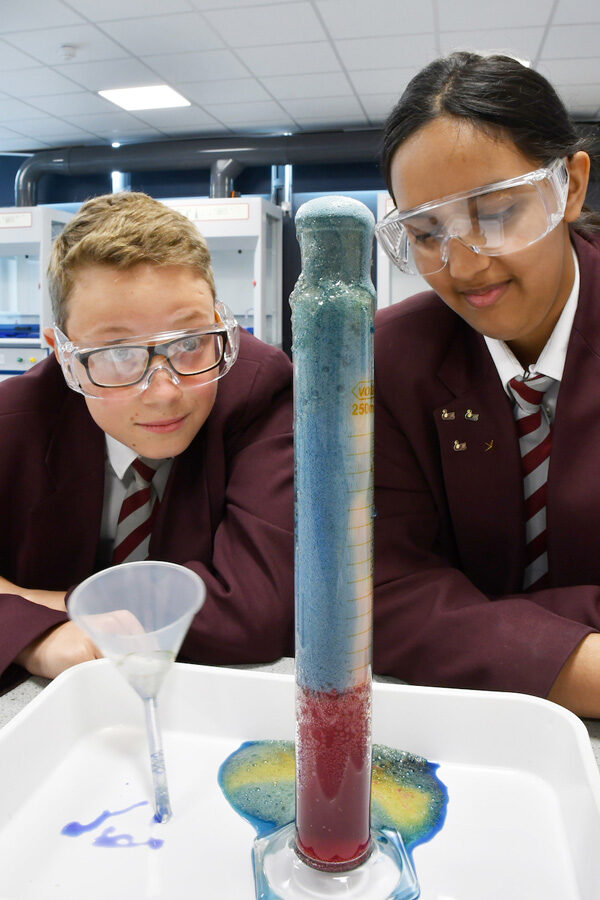
What do the students think about their experiences of being a science student at Alsager School?
What does it mean to be a Science student at Alsager?
“To be a science student means an opportunity to learn more about science in the real world. We learn about amazing professors who have changed the way we see the world. It also gives you the chance to work in a lab with equipment which helps us to understand our work more.”
“I love studying science at Alsager! As difficult as the subject is, it is very easy to get your head around the content as long as you are willing to put the work in. I think the course is very interesting, especially topic 8 of the A2 biology section- genetics! It makes you feel like an actual scientist and gives an insight into what a career in science would hold. The support that you get from the teachers is outstanding, they are with you every step of the way no matter what”
“It means that you have a strong network of support and a community of hard-working students to work with and find the solutions to problems.”
“Learning new skills and knowledge that will help you and benefit you for the rest of your life. Whilst learning you also have lots of fun and enjoy the subjects thoroughly through interest and passion”.
What skills have you gained from studying Science?
“Learning to be more independent and evaluative, so when faced with a problem I can identify reasons for the problem, outcomes and solutions.”
“I have gained and improved a lot with my practical skills as I’ve had the opportunity to use different equipment to find out new things”
“From studying science, I have gained team work skills, communication skills and it has also helped me to gain confidence”
“To be a team player; someone who contributes and works well with others to produce good work”
Has studying science helped you to understand the wider word?
“Yes definitely – you learn more about how our body and our world works. This really helps when considering future careers”
“Yes- there’s lots of applicable and relatable content. For example, our work on ‘Infection and Response’ in biology helped me to understand what happens when people are ill and the ‘Electricity’ unit in Physics explained the importance of appliances and the National Grid.”
“With more knowledge comes a better understanding naturally of the world.”
“I have loved doing all three sciences because each individual science is so interesting in its own way and I love how they all link and cross over and help you to understand the real world and have a better knowledge of how the world and everything in it works.”
How have we challenged you?
“Science lessons are delivered in a wide variety of formats. For example, practical work which truly tests our skills and is engaging.”
“We are especially challenged in practical work as you have to be quite independent and work things out for yourself, using the knowledge you have to understand certain outcomes and observations and when things don’t work, working out why and correcting them; that is challenging!”.
“I have been challenged as during my studies at GCSE level, the teacher has introduced us to some A level content to challenge and further my knowledge to give me a better understanding.”
Have you been inspired by science?
“The final topic of the A2 biology course has been genuinely inspiring to me! I often find myself in awe of clever scientists that have thought of things such as genetic fingerprinting, the theory behind epigenetics and cracking the DNA code. Lots of these processes have taken over 20 years to achieve, but they persisted. It just goes to show that you really can do anything if you are willing to put the time and effort in!”
“Yes – I have been inspired to conduct my own research and to want to study science further.”
“Learning about famous professors who have changed and influenced science to what it is now is very inspiring as it just shows you how science is in the world around us, as well as career aspects in the future.”
“Yes, all my lessons and the science live lecture event last year has inspired me. Learning about all of the different parts of science and how they all come together and cross over with each other has inspired me to look into a career into science.”
“My biology teacher’s passion for any scientist she talks about inspires me massively, it helps me as it shows she is as passionate as I am and also inspires me to aim to be one of the people she admires”
How do you get to use practical skills taught to you in Science and how do they help you?
“At Alsager school, being a science student is to work safely with teachers and peers, while doing all the fun practical work in high spec labs with amazing quality equipment. You not only develop teamwork skills but also communication skills with fellow peers and highly skilled teachers.”
“My favourite part of science is the practical work because it is hands on and simulates real life tasks as a scientist.”
“Practical skills help a lot with our topics. It helps by giving a visual representation of a process and this enhances our understanding as well as curiosity on what would happen if I did this or did that.”
“You get to use practical skills all throughout the sciences, whether it be a flame test or growing bacteria on an agar plate. These experiments really help me to consolidate what I have learnt.”
What is like to be a Sixth Form student at Alsager School?
We are incredibly proud of our Sixth Form Students at Alsager School. When they reach year 12 and join A6 they have become the elders of the school community and they soon adapt to their new position as role models for the younger students in the school.
During their time in A6 students are encouraged to be part of a successful and caring learning community which inspires individuals to meet the challenges of the future and to make a positive contribution to the local community. We are proud to be a broad, inclusive Sixth Form which offers a range of courses to suit students of all aptitudes. Every year 12 and 13 student benefits from a caring and enriching learning environment as our pastoral structure ensures that we get to know students as individuals. Most of our Year 11 students stay on with us and every year they are joined by ambitious, hardworking students from other schools. These students quickly settle in and comment on how friendly, welcoming and supportive our whole school community is. At the end of year 13 students move on to a range of destinations including university and apprenticeships in competitive industries. It is always uplifting to hear from students after they have left A6 and to find out about their life after Alsager.
Mrs Pole
Director of Sixth Form
Perhaps the best people to talk about A6 are our students themselves.
“Being a student at A6 totally changed how I am as a person and a student, the demands and the of nature of A levels have encouraged me to work more independently. I soon developed the habit of using my study periods effectively outside the lessons, this is something that will be beneficial for university and later in the workplace. As sixth form students we are also expected to further research beyond the taught content and this only serves to further your passion and enthusiasm for your subject. In a normal day as well as attending lessons in my study periods I work on homework, wider reading and revision. As we are relatively a small sixth form, I know I can have close contact with my teachers who can explain and give me bespoke support with my work. I also know that if I need general advice and support the Sixth Form Team will help guide me through challenges such as job interviews or university. Additionally, I have benefitted from trips to universities, HE fairs and visiting speakers who talk about financial management, gap year opportunities job applications and personal safety to name but a few.
However, the Sixth Form here at Alsager does not expect you just to study, it also expects you to give back to the school or local community and to invest in your own personal development. There are many ways that you can do this, for example you could help run clubs, help in local primary schools or help students as a peer mentor. Giving back is a key part of the Sixth Form ethos and to that end we are active when it comes to charity fundraising. Annually we hold a Macmillan Coffee morning and a sponsored fancy dress walk as well as individual charity events organized by each form. Additionally, you can apply to become a part of the Student Leadership Team and have a key voice in decisions and Sixth Form life as well as developing your self confidence and leadership skills. There is so much on offer to support you and to enable you to develop as a person.”
“My experience as a sixth former was inspiring and absolutely brilliant. Teachers go out of their way and spend time with you to ensure you are reaching your full potential. This is above and beyond anything I could ever ask for from a Sixth Form. From support with UCAS forms and work to support with mental health and well-being the Sixth Form Team are there to ensure that each individual is happy and content.”
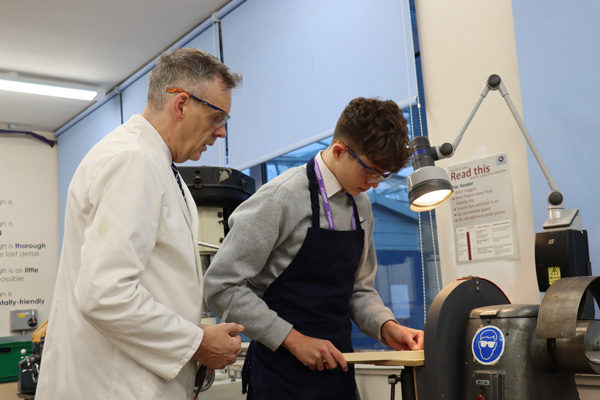
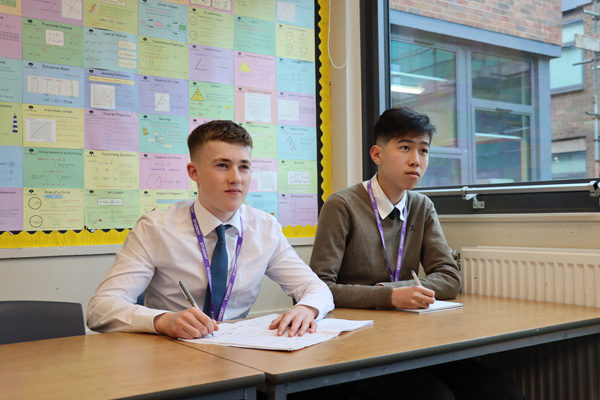
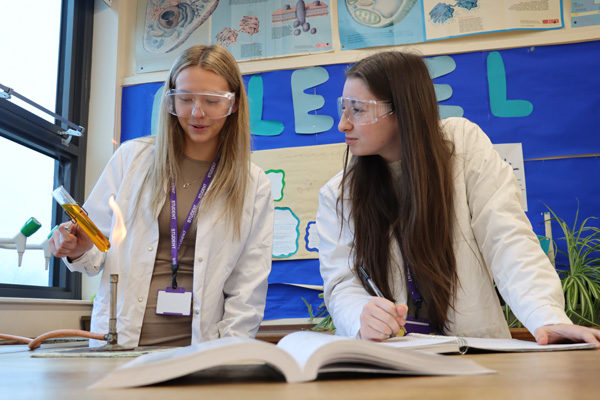
“Being able to organise events such as carol singing at a local old people home has not only helped my interpersonal skills but also impacted on the culture of the Sixth Form and relations with the local community.”
“For me, getting the best out of being in the Sixth Form has been about taking advantage of the opportunities on offer such as the UCAS fair and talks about issues such as finance which inevitably help us to plan our future.”
“Sixth Form studies have enabled me to study subjects in a much greater depth whilst also developing the skills that I need for university.”
“My two years in the Sixth Form have really helped me to develop my self-confidence. I have become more independent and organised and have even taken up a leadership role. However, when I do need help, I know that there are always people in the Sixth Form Office to support me.”
We are very proud to be able to offer this invaluable subject that will support students with cooking skills and nutrition knowledge for life.
In Key Stage 3 Tech Food is split into practical and theory lessons. We do one practical lesson a week, which is linked to the theory we are covering in the other lessons. The aim is to build up a variety of practical skills and the linked theory knowledge. Students also get the opportunity to use exciting food equipment such as pasta makers, processors and food probes.
In year 9, the focus is on food, nutrition and health, food science and food safety. In year 10, the focus is on food choice and food provenance. Year 11 is a combination of 2 written pieces of coursework called NEA’s. NEA 1 is worth 15% of the GCSE, NEA 2 is worth 35% of the GCSE, and there is a final written exam at the end of Year 11 worth the remaining 50%.
We consistently have an excellent uptake for this subject as students show real enthusiasm and enjoyment for the subject. You get to be creative and learn and develop a skill that will be utilised for life.
Mrs Smith (Food Preparation and Nutrition Teacher)
